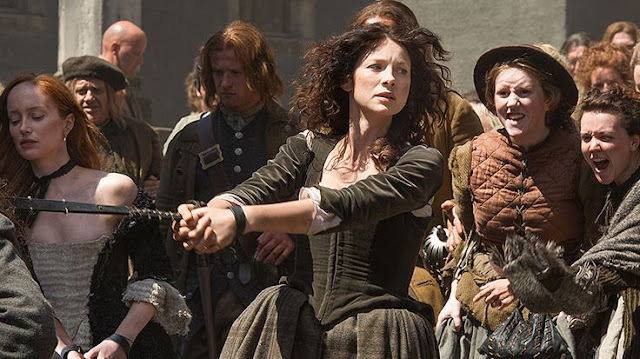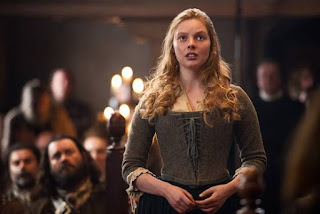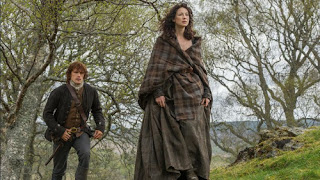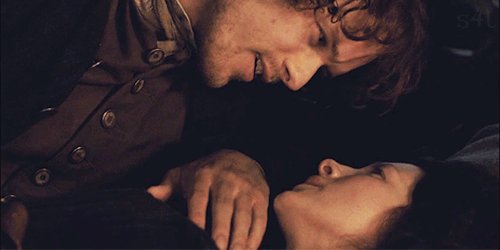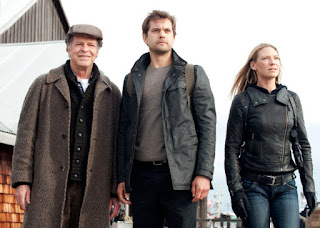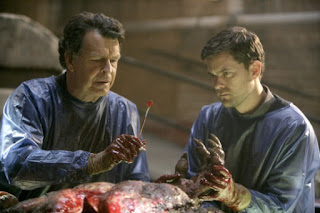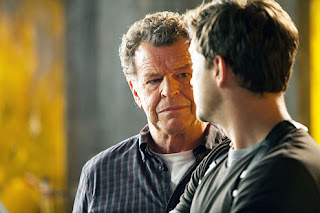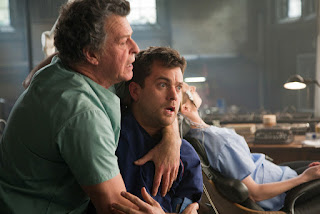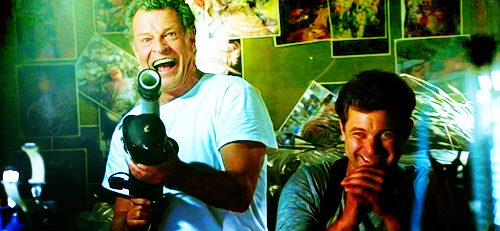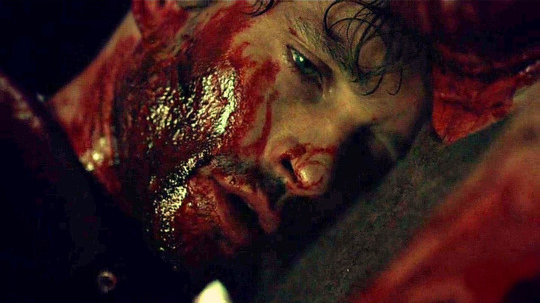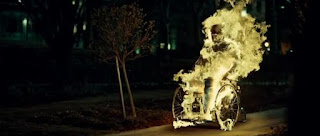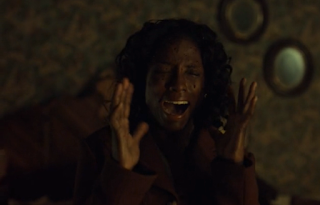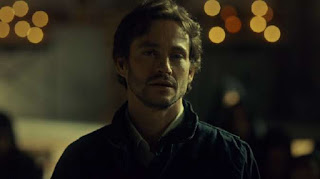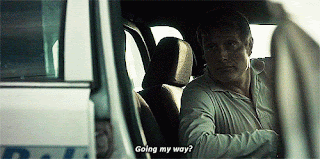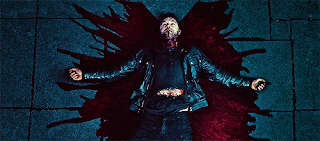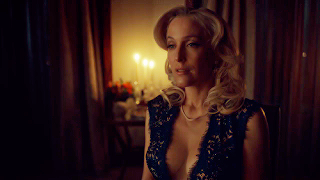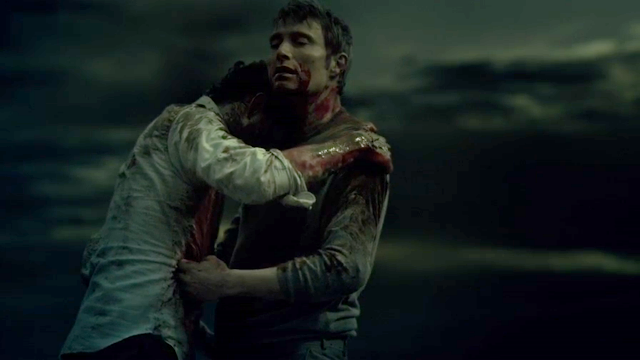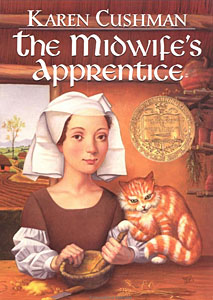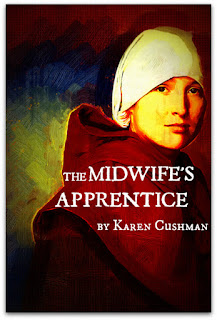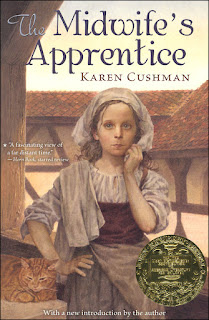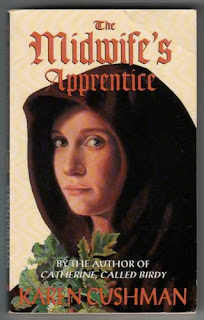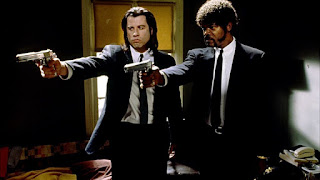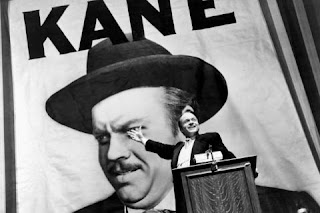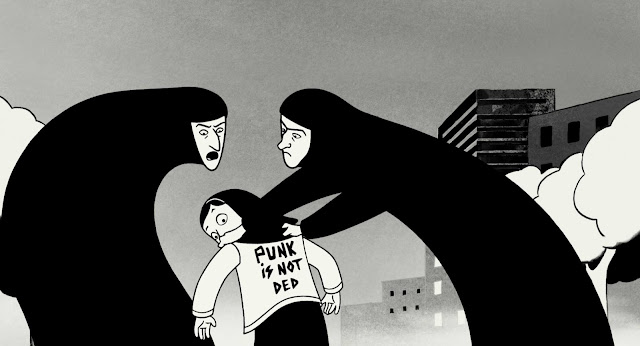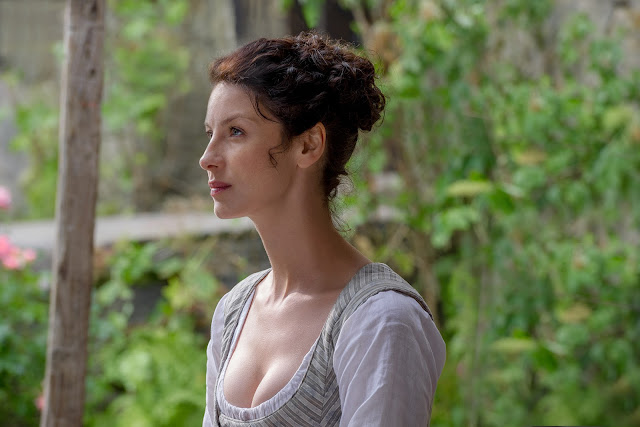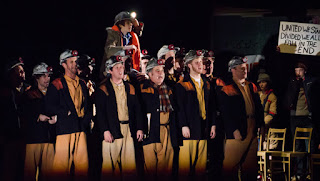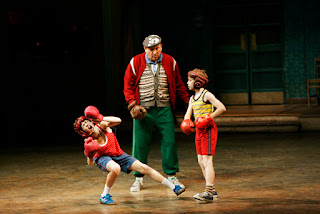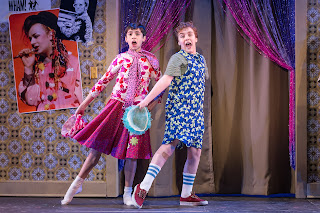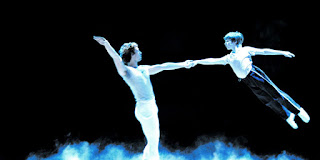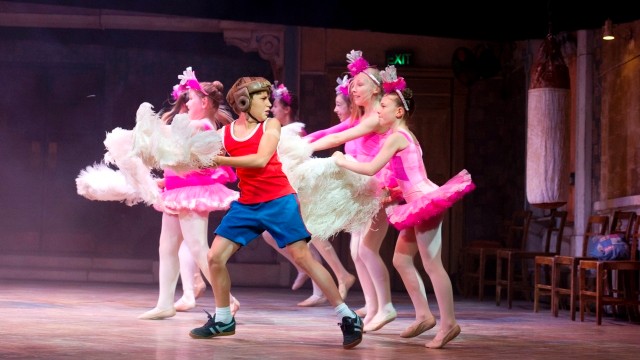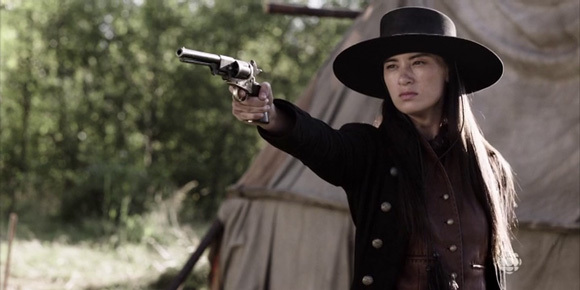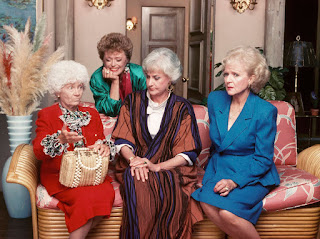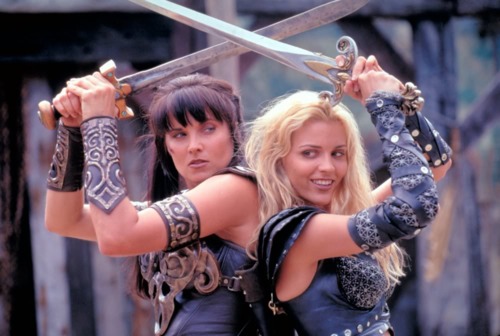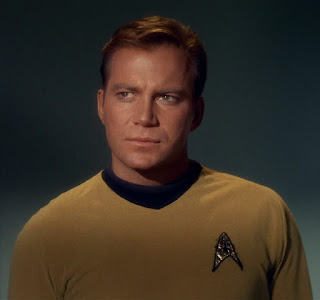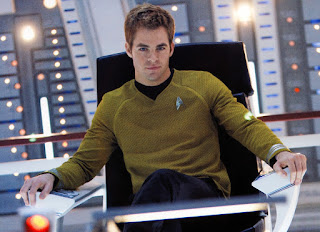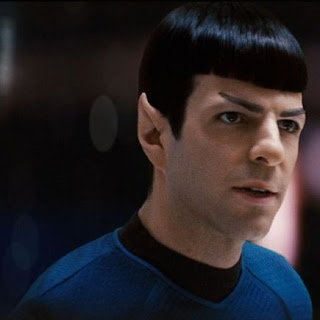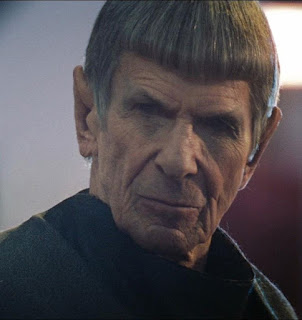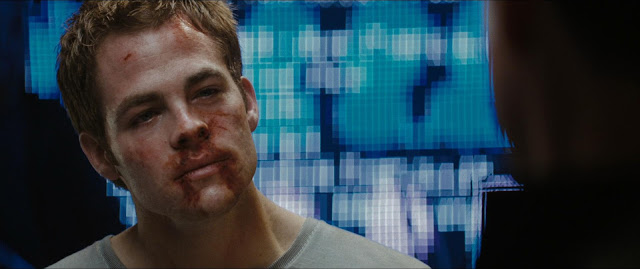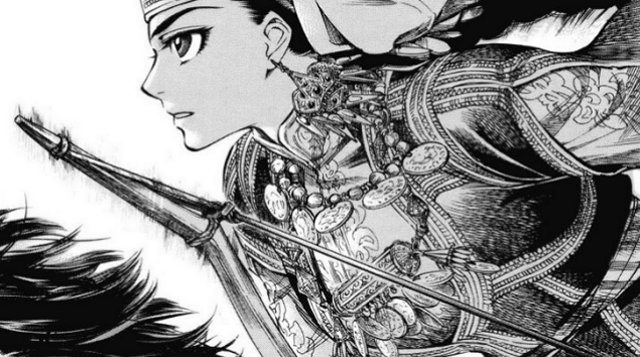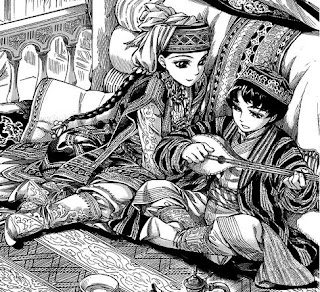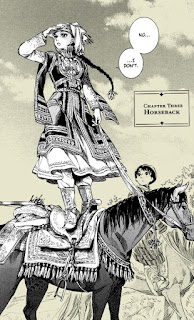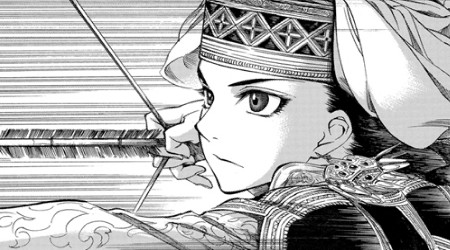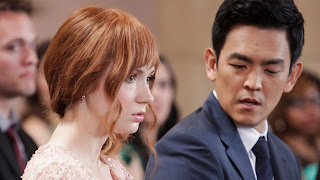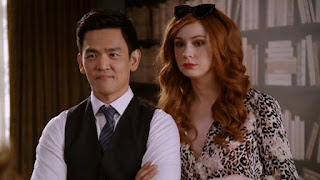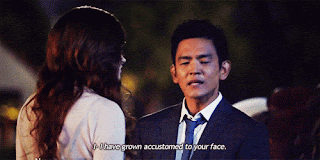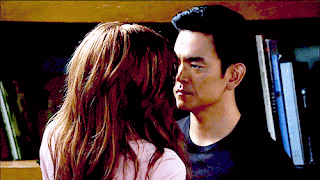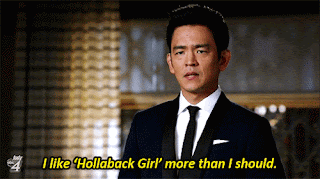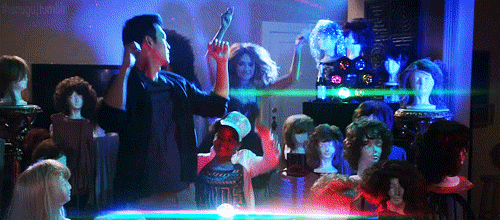September 23, 2015, 12:21 pm
In a kind of hilariously apt turn of events, today's article is a little late because I was out last night (when I traditionally write my articles) trying to make some new friends. Since I haven't lived in Massachusetts in a decade or so, I don't have a lot of friends still around in this area, or at least not people I've kept in very close touch with. So last night was my chance to go to a church event and meet some nice people who I might possibly be able to make friends with.
I mention this as being "hilariously apt" because my socializing last night is the reason I couldn't come home and write an article for you on a book series that very deeply examines friendship. Because I was out making friends. Get it?!
The Raven Cycle is a series of four books (three of which are already out) by Maggie Stiefvater that consider deeply the friendships we make throughout our lives. Also it's about a bunch of kids trying to find a Welsh king who may or may not have been buried somewhere in Virginia and who might be supernaturally just sleeping and not actually dead. It's about a lot of things. But mostly friendship.
See, while the story is all about the quest to wake this Welsh king, it's also about a group of high schoolers navigating their relationships. And for all that the plot is fantastical and supernatural and weird, the relationships are very human. Gansey has a crush on Blue. Blue is afraid of her feelings for Gansey so she dates Adam instead. Adam has no idea how he actually feels about Blue and is so stressed out he feels like he might be dying. Ronan has a crush on Adam. And in the background Noah is falling apart.
It's all about the relationships, and about how relationships and friendships are tangled up together in a way that is both completely understandable and unavoidable, and also frustrating and bad. This is a series that reminds us of the complexity of a single human being and then marvels at who we can be when put in a group. The grand achievements we can aspire to, and the petty arguments that pull us apart. The Raven Cycle is about friendship way before it's about anything else, and I love that.
Still, before we go any deeper, we should probably talk plot.
![]() The first book of the series, The Raven Boys, explains how small town girl Blue Sargent finds herself caught up with a group of boys from the local boys only prestigious boarding school. Blue is a townie in Henrietta, Virginia. But far from the stereotype of the sweet nice girl, or the "too cool" girl, who populate young adult fiction these days, Blue is just plain weird. Weird by anyone's standards.
The first book of the series, The Raven Boys, explains how small town girl Blue Sargent finds herself caught up with a group of boys from the local boys only prestigious boarding school. Blue is a townie in Henrietta, Virginia. But far from the stereotype of the sweet nice girl, or the "too cool" girl, who populate young adult fiction these days, Blue is just plain weird. Weird by anyone's standards.
Blue is the daughter of her town's local psychic. Or rather, Blue is the youngest child in a whole family, a matriarchy, of psychics. Her mother, Maura, is really the best known, but Blue lives in a house positively overflowing with psychic women. There's her cousin Orla, who runs a psychic telephone hotline, her mother's friend Calla, who can get psychic readings off of objects she touches, various vague female relations scattered throughout the house and yard, all of them incredibly powerful psychics. Except for Blue. Blue's only gift is that she can make psychics stronger - she has no powers of her own.
Blue, then, is our main character, and a fascinating one she is. She's simultaneously self-assured and also unsure of what to do with her life. As the only non-psychic in a lineage of powerful witch-women, she's sort of at odds with her life. Sure, she could stay in the house at 300 Fox Way, making special teas to sell the people who come in for tarot readings, amplifying everyone's powers, making her way with the women of her family, or... Or she could not do that? Blue wants adventure and newness and life, but she isn't totally sure what to do about it.
Until, that is, she accompanies her mother to a yearly event at a local church. There, one night a year, those blessed with "sight" can see a procession of all the people who will die in the next year. Her mother always goes and makes a list of these people and it's known in some circles that if you want to know if you'll die that year, you can ask Maura and then get your affairs in order. It's helpful. Blue's just there to write names down and help amp up Maura's power, but she gets the shock her life when one of the spirits is actually visible to her. It's a boy, about her age, wearing the sweater of a private school boy. When she asks for his name he says "Gansey."
Obviously Blue is freaked the hell out. She isn't supposed to be able to see spirits. She doesn't have that power. In addition to all of that, Blue has a prophecy dangling over her head: if she ever kisses her true love, he'll die. So there's that.
And because this is a novel, Blue doesn't have to wait too long before "Gansey" appears in her life. He shows up at the pizza parlor where she works, accompanied by all of his friends, and she decides immediately that she hates him. He's rich and smarmy and smiles too easily and with too many shiny white teeth.
But she ends up involved anyway. Gansey, you see, is a private school boy with a mission. He's a weird kid. He's trying to track the ley lines of Virginia because he has a personal quest to discover the resting place of the Welsh king Glendower. And he thinks that Glendower is somewhere nearby. If he discovers him, wakes him from his sleep, then Gansey will get a "boon" - some kind of magical gift or blessing or pardon. And this has been Gansey's obsession and life's mission since he was a kid.
![]() His friends are all committed to the mission as well, but each for their individual reasons. As Blue becomes more and more caught up for the search for Glendower and the lives of her "Raven boys", she discovers what those reasons are. Ronan, for example, helps Gansey out of an unflinching loyalty. Gansey stood by him through the most difficult times of his life so he helps Gansey with his quest. Adam, however, is different. He's a scholarship student at the school and helps Gansey partly out of friendship and also partly because he really wants that "boon", whatever it might end up being. And Noah, well, Noah has his own reasons for helping Gansey, which become clear at the end of the first book.
His friends are all committed to the mission as well, but each for their individual reasons. As Blue becomes more and more caught up for the search for Glendower and the lives of her "Raven boys", she discovers what those reasons are. Ronan, for example, helps Gansey out of an unflinching loyalty. Gansey stood by him through the most difficult times of his life so he helps Gansey with his quest. Adam, however, is different. He's a scholarship student at the school and helps Gansey partly out of friendship and also partly because he really wants that "boon", whatever it might end up being. And Noah, well, Noah has his own reasons for helping Gansey, which become clear at the end of the first book.
As the story progresses, all of these relationships get deeper. All of the characters become more invested in their quest, sure, but they also become more invested in each other. Through the trials that come in each book - The Raven Boys has a murderous former student tracking the boys down, while Dream Thieves involves someone sending a hit man after Ronan, and Blue Lily, Lily Blue features a pair of sociopathic rich people trying to find Glendower first and also kill everyone - these characters only become more entangled and more interested in each other. It's almost like constantly fearing for their lives and having a greater calling binds them together.
Funny thing.
And that's what I actually want to talk about. What I love about these books is the plot, sure, but it's more the way that they portray friendship. I think The Raven Cycle is one of the most coherent examinations of that topic I've seen in a long time. It looks at the way that real, life-changing friendships form, but it also looks at the cracks and tears that can come in friendships. The drifting apart and the fights and the arguments. It looks at all of the aspects of what it means to be a friend, and it doesn't flinch back from any hard truths.
The main thing the book emphasizes is that friendships are deepened and solidified when you have a common purpose. Not a common enemy, not really, but a common goal. You get close to people who you share a mission with. And it's not hard to see why. I mean, if you share a mission, then these are people you have to work closely with. They're people who are chasing after the same things you are. They're people who share your beliefs and experiences. Look at the trio in Harry Potter or Leslie Knope and her "workplace proximity associates" in Parks and Rec - their friendships thrive because they're all chasing after the same things.
Just from personal experience alone I know this to be true. The deepest friendships I have are with people who I did ministry with. They're with people who share my life experiences, yes, but also people who bled and cried and sweated with me in trying to do something we all thought was incredibly important. Even after we're done doing the thing, those friendships remain incredibly strong because their foundation is an understanding of mutual goal and respect.
But, as The Raven Cycle points out, just because you have a deep friendship founded on a common goal doesn't mean you won't also get in fights and arguments. The books show instances where each of the characters is tested and put at odds with the rest of the group. There's Adam's descent into madness as he tries to handle the power of having a magical forest in his head.* There's Ronan's decision to take himself and his bad life choices - drugs, street racing, questionable friendships - far away from the group and ignore all of them so they don't try to make him feel responsible. Blue gets fed up and goes away for a while. Noah has flashes of sudden rage and irreconcilable grief. Gansey can be, well, an asshole.
![]() No human being is perfect and so no friendship is perfect. We all have moments when we love our friends deeply and also want to murder them so hard. It's normal and natural and the books point out that learning to deal with this is just another aspect of being a good friend.
No human being is perfect and so no friendship is perfect. We all have moments when we love our friends deeply and also want to murder them so hard. It's normal and natural and the books point out that learning to deal with this is just another aspect of being a good friend.
The books actually look at this inter-generationally too, by giving us an example of a friend group who went through something similar a long time ago - a common purpose binding them together and giving them a mission - and how they've now matured into their friendship. With Maura, Blue's mom, and her best friends Calla and Persephone, we get representations of how this is true of friendships no matter the age. The people who go on mission with you are the people you cherish for the rest of your life. No one knows you better than the people who have worked beside you on a cause you care about deeply, right?
I mean, just on a purely surface level, I love Maura, Calla, and Persephone because they're presented as being fun and funny and still very good friends after all these years. It's rare to see representations of middle-aged women being friends like this, and even rarer to see it in the context of these women being pseudo-parents to a child and being the ones entrusted with raising this kid. Calla and Persephone aren't exactly mothers to Blue, but they're something. They're constants in her life, and a clear sign that the friends we make affect everyone else around us as well.
I guess the point I'm getting at here is that friendship is something you do, not an intrinsic part of who you are. Being a friend means actually doing things with your friends. There's the emotional component of caring about them as a human being and asking about their life and telling them how much they matter to you, but there's also a more practical aspect of the things you do together. Your friendships are something that you do, that you invest in, and your friends are the people you do them with.
The last book of the Raven Cycle isn't out yet, but I have every confidence that it's going to hold this up. And yeah, there are lots of reasons why you should read these books (lots of powerful psychic ladies, a rad female main character, cool plot, The Grey Man, and more), but this is the one that sprung first to my mind. Friends. Mission. Doing things together because you think it matters.
What more do you need?
*One of the more interesting plotlines of the books, to be sure.
↧
September 24, 2015, 9:00 am
Well, as we could tell from the end of last week's episode, this particular installment of "Claire Beauchamp Randall Fraser vs. the eighteenth century" was no picnic. Yet, despite all of the horribleness on display this episode, I have to say it's my favorite so far. I mean, it certainly has the most concise plot of any of them thus far, following exactly one storyline.
And for all that it's a whole episode about Claire and Geilis being tried as witches because the local people see Claire's healing abilities not as evidence of scientific progress but as proof she has consort with demons, it's also an episode about women reclaiming the spaces they are forced into. It has some of the most powerful moments of agency in the series so far, and if nothing else it really convinces you that Claire could have done a lot worse when she married Jamie Fraser.
So, with no further ado, what happened in this episode?
As I hinted above, we start off only moments after we stopped last week. Claire and Geilis have been thrown in the thieves hold to await their trial. Claire is incensed that this has happened to her. After all, she's a servant of the Laird MacKenzie! Surely he will send for her and make all of this stop. Or maybe the townsfolk will see reason. Geilis might be a murderer - is a murderer as far as Claire can tell - but Claire's innocent. She's not a witch. They've got to see that!
To no one's surprise but Claire's, no one sees that. To their eyes she is absolutely definitely a witch. Claire takes some of her frustration out on Geilis, pointing out that if it hadn't been such common knowledge that Geilis made potions and danced naked under the full moon, they wouldn't be there right now. Which is true. But Geilis fires back with the fact that she didn't make Claire come see her that night. She did nothing of the sort. Geilis has a very realistic view of the outcome of their situation.
Well, she has a more realistic view of it all once Claire disabuses her of the notion that Dougal MacKenzie is going to ride in and save them. Claire explains that Colum banished Dougal, taking Jamie along with him, so no one is coming to help them. If Colum closes his doors then they officially have no friends and are screwed.
Geilis figures the solution here is to spend her little time left on earth being friendly with Claire, then, because that makes sense. Claire is less enthused on this topic, and even goes so far as to shiver all night in the hold rather than go to Geilis for literal warmth. Stubborn woman.
The first day of their trial is about as to be expected, honestly. The testimonies heard range from ridiculous to painfully accurate. On the plus side, Ned Gowan, Colum's lawyer, manages to talk his way in and get himself appointed as their lawyer. On the down side, not even Ned's fancy talking can get them out of this. He does a good job talking around and twisting the story to get Claire for being blamed for the death of the changeling child - you know, the baby she found in the woods last episode and tried to save - but even Ned can't work against Laoghaire's big eyes and little sobs about how Claire bewitched Jamie and stole the love of her life.
![]()
In most shows I would get frustrated about this because it's bad writing. It's writing a stereotype. But it works here in Outlander because, well, Laoghaire isn't representative of anyone or thing besides Laoghaire. There is such a wealth of complex and interesting female characters that it's okay, and even realistic, to have one who is just a total bitch. I can actually really appreciate that, strange as it may seem.
Anyway.
The first day of the trial concludes basically with the understanding that things are better than they were in the morning, but that Claire and Geilis are both probably going to hang tomorrow. Cheerful. So Ned sends them off with a flask of whiskey for the night and they sit in the cell drinking and talking. Claire can't stay mad at her friend, not considering what's happening in their lives, so they really do talk.
Geilis confesses that she genuinely loves and cares for Dougal. He has a mind to match hers and he cares so deeply about Scottish independence. Claire is actually kind of surprised by how political it turns out that Geilis really is, but Geilis reveals that she's been politically motivated all along. That's why she murdered her poor dead husband - he was rich and she could fund the Jacobite cause through him. That's why she settled here in the first place. Geilis will play a role in the rising and no one can stop her, not even death.
The next day brings, as expected, no good news. The townspeople want a witch to burn. Even when the priest comes forward and admits that Claire was able to heal a boy when he was not and he wishes God to forgive him for doubting her, the people still bray for blood.* Ned can't save them. Nothing can.
![]() So, in a moment of terrifying calculation, Ned pulls both his clients into a side room and tells it to them straight: one of them will burn today. There's too much "evidence", and, frankly, the people are too worked up for it to go otherwise. One of them will burn. But it only has to be one.
So, in a moment of terrifying calculation, Ned pulls both his clients into a side room and tells it to them straight: one of them will burn today. There's too much "evidence", and, frankly, the people are too worked up for it to go otherwise. One of them will burn. But it only has to be one.
Ned tells Claire to claim that Geilis bewitched her. Geilis really has no reputation to speak of with these people, so there's probably no saving her. But Claire can save herself if she condemns Geilis to die. Claire's not into this idea, and obviously neither is Geilis. So when Ned gives them a moment alone to talk, Geilis has something very important to ask Claire: Why are you here?
Geilis has known that Claire was lying about her intentions and appearance in Scotland all along, and she's made that clear, but now she demands to know, once and for all, why Claire is here. Claire, sadly, has no good answer to give her. Even the truth, that it was an accident, is no help. That's not what Geilis wanted to hear. She wanted to hear that Claire is here to help the rebellion. She wanted to hear that there was a purpose or a plan. She's basically begging Claire to reassure her that her death won't be in vain, and Claire can't.
Which is how we get Geilis, furious, storming back into the courtroom and what she knows will be a guilty verdict, spitting out the words, "Looks like I'm going to a fucking barbecue."
If you're thinking that this is a strange thing for a woman in the eighteenth century to say off the top of her head, well thought. It's kind of an odd moment.
But there's a lot going on. The women go back out and find that, yeah, they're facing a guilty verdict. Ned sets the stage for Claire to get herself off by blaming Geilis, but when the time comes Claire just can't do it. She refuses to deny her friend, even while Geilis is calling her an idiot.
That's not to say that Claire is going quietly, though. As they pull her off the dock and towards the stake where she'll be burnt, Claire yells and swears so much that they decide to punish her. The men rip her dress down the back and flog her while Claire screams out and Geilis is forced to watch. It looks like everything is over until...
A familiar head of red hair shoves his way through the crowd and kicks the attackers off his wife. Jamie freaking Fraser, back from who knows where and who knows how, has his sword out to defend his wife because, you know, he swore before God that he was going to do that. And, to be fair, it's not like the court can argue with that statement. Much as they clearly want to.
Still, Jamie is in contempt. It looks like they're going to meet a messy end together when Geilis yells for everyone to stop. With a final look at Claire, Geilis does the thing it didn't seem possible to do: she both gives in to the crowd and also takes back her agency. She starts confessing. She tells everyone that she is a witch and Claire did nothing. Claire was bewitched. She raves about serving Satan and being a servant of evil. She pulls down her sleeve and shows "the devil's mark".
It's only then that Claire puts together what I think a lot of us suspected by then. See, Geilis' devil's mark is a very familiar size and shape. Because it's not a birthmark or a normal scar. It's the scar from a smallpox vaccine.
Geilis knew Claire was from the future all along. She just didn't know why. Geilis herself was from 1968, the number she whispered to Claire when they were in the dock. She must have come back to try to change the past, to make it so that the Scottish rising succeeded after all. It's why Geilis was always so suspicious, why she felt so otherworldly and out of touch. It's why she perked up when Claire quoted Nathan Hale's words from 1776: "I only regret that I have but one life to give for my country." Geilis recognized that because she must have learned it in history class.
![]()
Respect.
It's not until Jamie and Claire are out in the woods that they stop long enough for Jamie to see to the welts on Claire's back. They're not bad, just shallow, but he is so sad that she had to receive them. He's also in need of answers. Mostly to the most obvious question: Is Claire actually a witch?
Well, no, she's not. And Jamie believes her when she says it, but he has to point out that if Geilis had the "devil's mark" then so does Claire. It's true - Claire has a smallpox vaccine scar. It's then that Claire decides to tell her husband the truth once and for all. All of it. She tells him she's from the future. She tells him that she can walk through a room of the dying and the dead and not get sick because of medicine so advanced it might as well be magic. She tells him she traveled to the past via the stones. She tells him actually and honestly everything. And you know what Jamie says at the end?
"I believe you."
Hell freaking yes, Jamie Fraser is a good husband and a good man. Yes, he has his moments of lunkheaded macho man posturing, but this is his response when his wife basically tells him she's a magical timetraveler from the future and that she's not a witch, no, but something even worse and more complicated. He believes her. He even makes a joke. "It would have been a good deal easier if you'd only been a witch."
With all that Claire has told him, it's clear that Jamie has much to think on. But he does take a moment to apologize to her for his actions when she ran away and he beat her for bringing such trouble on them. He gets now that she was trying to get back to the standing stones and go home, and he is distraught to think that he beat her for wanting that. It's such a good thing to want!
![]() The truth having finally come out, Claire finds herself much happier and more content, even with the circumstances, but nothing is actually resolved. Now both of them are outcasts from their communities. They can't go back to Castle Leoch, and Jamie still has a price on his head. So, what now?
The truth having finally come out, Claire finds herself much happier and more content, even with the circumstances, but nothing is actually resolved. Now both of them are outcasts from their communities. They can't go back to Castle Leoch, and Jamie still has a price on his head. So, what now?
Well, Jamie thinks they should go to Lallybroch, his family home. And Claire is amenable if not thrilled. But before they get there, Jamie has a surprise. In the morning, after some very sweet and tender sex the night before, Jamie takes Claire up and over a hill and shows her...the stones. The very stones she came through and that she's been trying to reach since the first episode. They're finally within reach and he even walks her right over to them.
It just makes sense, is what he tells her, although we the audience can see how much Jamie clearly doesn't want Claire to go. She's not of this time and she has the opportunity to go back home, to her first husband and her life and world. She can be safe and happy and not constantly living in fear in an uncertain world full of danger. Claire should go.
Seriously, Jamie Fraser is really cementing himself as the posterboy for ideal love interest here. He lets Claire decide if she'll stay or go, but makes it abundantly clear that she shouldn't stay just for him. She should go where her heart feels it belongs.
Which leaves us with Claire, in shock, staring up at the stones and contemplating her two wedding rings. It's a beautiful, basically silent scene, as we think through with her the possible futures she could have. Apparently decided, Claire gets up, walks to the stone and then -
We cut to Jamie crying gently by the fire where they camped the night before. And with Jamie we start and smile to hear Claire demand that he get up. She didn't go after all! She came back for him! There's nothing really to be said, as Claire's decision is abundantly obvious. All she says is that it's time for them to go to Lallybroch.
So take a wild guess what next episode will be about...
Like I said above, this might be my favorite episode of the show so far. For all that it's about a horrible historical thing - witch trials - and how women suffered and were punished for stepping outside of society's very narrow prescription of who they could be, this is also an episode with a lot of important feminist moments. Geilis choosing how she will go to her death is a very powerful scene. She knows she'll die, so she decides she wants to die on her terms because of something she actually did. She's amazing.
And the scenes where Jamie is faced with a story that is ridiculous and absurd and hard to swallow, and simply turns to his wife and says, "I believe you"? They're like a balm to the soul for any woman who has been told that her story is too outrageous and too ridiculous, for anyone who has had a loved one refuse to understand. There's a power in just being listened to, and Jamie Fraser gets it the hell right.
Through it all, we have Claire, dependable and solidly pragmatic Claire. She's so strong. She refuses to sell out a friend even when it means she'll die. She tells her husband the truth even though he might call her a witch and abandon her. She chooses to go back to him even though she knows their lives will be hard and probably short. She chooses at every venture the hardest option. Because it's the right one.
A good episode all around.
*This was one of the more confusing plots of the episode. Because, he seems sincere, but then he sits down and there's this nasty look he shoots her. The people then respond to his testimony by saying that it's super obvious she bewitched him, and from the look on his face he is pleased with this result. So, I guess he was hoping to get Claire burned at the stake but he wanted to do it with a clean conscience? That's messed the hell up.
↧
↧
September 28, 2015, 9:25 am
You know, for a show that really just felt like an updated version of the X Files, and for a creator as insistently deaf to any frustrations people might have with how he portrays female characters (see: JJ Abrams and anything written about Star Trek: Into Darkness), Fringe is a shockingly complex and interesting show.
It's complex on a number of levels - most of the plot serves as a dissection of normal science fiction tropes while also appreciating those same tropes and incorporating them into a larger mythos - but the aspect I find most interesting is how the show deals with gender. For starters, it has a female protagonist, Olivia Dunham (Anna Torv), a woman who seems like she ought to hit every button of a badly written "strong female character", but who's actually just really cool and badass.
Olivia, who is an FBI agent, becomes embroiled in an investigation of the weird science crimes that plague our world when her FBI partner/secret boyfriend is killed while they investigate a horrific act of bioterrorism. Only what turns out to be true is that said partner/boyfriend isn't exactly dead and wasn't exactly who she thought he was, and said bioterrorism attack was actually part of a series of strange science fiction events that the FBI calls "The Pattern."
So Olivia recruits the best possible people she can think of to help her solve the case: renowned mad scientist Dr. Walter Bishop (John Noble in what I consider his best role) and Dr. Bishop's son, Peter (Joshua Jackson). I mean, she doesn't actually want Peter to come along, but she needs him because only a relative can check Dr. Bishop out of the mental institution he's been staying in for the last seventeen years.
I wasn't kidding when I called him a mad scientist.
This is the plot of the first season or so. Olivia, Peter, and Walter fight crime with the help of Junior Agent Astrid Farnsworth (Jasika Nicole) and Agent Broyles (Lance Reddick) and mysterious executive at a science corporation Nina Sharp (Blair Brown). The crimes they fight are weird science fiction type crimes and they do it all from their hidden lab in the basement of Harvard University. Sound kind of like an episode of Scooby Doo crossed with the X Files? Good. I'm pretty sure that's what they were going for.
Still, it becomes clear pretty early on that the show has more up its sleeves than just moderately entertaining "case of the week" storytelling. And this is also where it gets more complex in its examinations of gender. I'll talk more about how Olivia is kind of my favorite person ever in another article - suffice to say that she might fit stereotypes about "strong female characters", but she's also one of the single most fully drawn characters I've ever seen on TV full stop - today we're going to talk about what this show has to say about masculinity.
See, masculinity in this show is actually really wrapped up in fatherhood. What does it mean to be a father, and even more, what does it mean to be a good father? And that question, in turn, becomes the backbone of the entire series. So, sorry to say that in order to discuss this with you, I'm kind of going to have to spoil the whole series. Whoops.
SPOILERS
For the majority of the first season, Peter and Walter have a very contentious relationship. Though not a lot of details are given, we know that Peter does not like his father. He doesn't even deign to call him "father". Upon being informed that his father needs to be released from a mental institution in the very first episode, Peter is unwilling to so much as sign a piece of paper having to do with his dear old dad. Olivia has to blackmail him into helping. As the season wears on, Peter begrudgingly puts up with Walter's antics, but it's clear he kind of hates his dad.
His father, after all, was a workaholic mad scientist who made his mother miserable and killed someone when he was a child. Peter grew up with a father who was cold and callous and genuinely cruel at times, a genius, sure, but not the kind of person you want around your kid. The fact that Walter is different now, that seventeen years in a mental institution has changed him irrevocably, makes little impression on Peter at first. He's abrupt and angry and rude and dismissive of Walter, and it's not hard to see why.
Eventually, though, even the hardest hearts can thaw, and so Peter becomes a bit gentler to his father. He learns to distinguish between Walter then and Walter now. That makes it all the more heartbreaking when, towards the end of the first season, we discover that there's something deeply wrong in that relationship, something Walter hasn't told his son: Peter is dead. Peter has been dead for a very long time.
Or, at least, that's what it looks like. While on a quest to stop the Pattern by repairing the hole in time and space that he himself tore twenty-five years ago, Walter and a strange "Observer" stop at a grave in Upstate New York. The grave is that of Peter Bishop, who died when he was a little boy. But that of course doesn't make sense. Peter is alive and well and in Boston. So what gives?
The answer comes to us over the course of the next season and it is absolutely devastating. Peter did die when he was a little boy. Peter Bishop was always a very sickly child and when he was nine or so he just didn't get better. Walter dedicated himself to finding a cure, but couldn't find anything. His son died. But.
Prior to this point, Walter had invented a window that would let him look into a parallel universe. In that universe he also found a Peter who was sick and a Walter trying to save him. But this Walter was close to succeeding, if only he hadn't been distracted at the last minute by the appearance of an Observer in his lab.* Our Walter is devastated by this realization, that the cure has been found and then immediately lost again, so he decides to do something about it. He couldn't save his Peter, but he can save this other Peter.
Which is how we come to Walter, on a frozen lake bed, tearing a whole in the fabric of two universes to save one little boy. Except everything goes wrong. The medicine is smashed in his journey through, so Walter has to take Peter with him to save him. Then the machine falls through the ice of the lake and Walter and Peter almost drown - it's only the Observer coming and fishing them out that saves them. Then Walter's wife stumbles across her husband saving an alternate version of their child, and she just can't bring herself to let him go again.
All of that is to say that in the story of Walter and Peter's relationship, Peter might be missing a few key details. Especially seeing as he's repressed the hell out of all of this.
As I'm sure you've gathered from this, the relationship between Walter and Peter is what comes to form the backbone of the series. Peter, upon discovering his true heritage and realizing that his father basically ended the world in order to save him, has some processing to do. The Pattern, after all, is nothing more than a spiral of cracks in their universe, all spreading outward through time and space from where Walter brought him through.
And the malicious attacks they've experienced are actually war cries from people on the other universe who think they are fighting for their very existences as they try to repair what was broken when Walter came through and ended their world. Later on, Peter determines that the only way to solve this, the only way to fix what was broken on his behalf, is to sacrifice himself by stepping into a machine that can bridge between the two universes, but in so doing he finds himself written out of existence.
![]()
Season four sees Walter haunted by visions of a man he doesn't recognize, and since this Walter was unsuccessful in saving either version of his son, he's hesitant to believe Peter even when he does appear. By the time he finally comes to agree that Peter is his son, it's almost too late. Peter is nearly killed or lost or broken. Season five sees them together once more, but it's in the face of a greater threat. It's with the understanding that both Peter and Walter are in danger of losing themselves in a fight against overwhelming odds, and that their love for each other might not be enough.
Fathers and sons. Or, really, fathers and children. For all that the show spends four seasons examining what it means for fathers to love their sons, digging deep into Walter and Peter's relationship but also showing us glimpses of other relationships like Broyles and his son Christopher, the fifth season shows us who Peter is as a father. In season five we meet Etta (Georgina Haig), Peter and Olivia's daughter. While Peter and Olivia and Walter (and Astrid) were trapped in amber, stuck in stasis and neither aging nor dying, Etta grew up. We meet her fully formed as an adult and a Fringe Agent, but also as a little girl delighted to have her parents with her again.
It's clear from the get-go that Peter and Etta are very close. They get each other. We also find out that losing Etta - she went missing when she was four, just before all of them went into amber - drove Peter mad with grief. It tore him and Olivia apart. When she dies again, this time as an adult, it rends Peter's world apart. He has no idea how to function in a world that would give him his child only to take her away again.
Throughout all of this, Walter himself is contemplating his feelings for Peter. Peter is his son, after all, but Walter knows better than anyone else the destructive power of grief. Walter knows that one cannot privilege the life of one child, even one's own child, over those of everyone else in the entire universe.
The show even uses two new characters, Donald and his son Michael, to examine this parent-child bone. Or, really, the bond of the father and his child. Donald knows that his son Michael must be sacrificed in order to save the human race. He only asks that he be allowed to sacrifice himself along with him so that they can be together and so that Michael won't be scared.
I think that for all of its flaws and failures and occasional inconsistencies in the writing or tone, Fringe had a lot to say about what it means to be a father and what it ultimately means to be a son. And I respect what they did say.
First, the show made it clear that while it is good to love your children and mourn them if/when they die, it is not good to make your child an idol. Walter and Peter both have their moments of elevating their dead children above every other human who has ever lived, and that's really not okay. I mean, it's an exaggerated example, obviously, but it also gets at something very true in all of us.
There's this idea that what it means to be a good father is to hold onto your child as the most precious thing. That no one should be able to blame a man for the things he does to protect his kids. No, this show says. That's not true. Even more, it argues that the child might not appreciate having such atrocities thrown at their feet.
Second, the series looks at what a "good father" actually is. Is Peter any less of a good father because he's openly emotional and fulfills more of a nurturing role while Olivia is the protector and the disciplinarian and the clear leader of their household? Hell no! Peter is a great dad, lapses in sanity aside. Gender roles don't matter so much as loving your child and appreciating them for who they really are. Peter is a good dad because he never demands that his daughter change to suit his needs, he just shows her that he believes she can be more than she might think.
Third, it goes into the idea that there is no single view of what fatherhood looks like. In Walter and Peter's case, it looks like a relationship that blooms very late in life. I mean, they aren't restored, not really, until Peter is well in his thirties and Walter is in his sixties. Their relationship is slow to grow, but eventually it comes together.
Then there's Peter and Etta. They bond, but in spurts and pieces. He doesn't even see her for twenty-one years, but when they reunite they learn how to be father and child again. Or what about Donald and Michael? Donald cannot understand Michael fully, but he loves him all the same. Broyles is willing to sacrifice anything, even his self-respect, for Christopher. And so on and so on and so on.
Finally, I think the most profound thing that Fringe ultimately has to say about fatherhood is that it changes you. Simply put, it changes you a lot. Walter in particular becomes a completely different person because he needs to be someone who his son can admire. He feels a need to win his son's respect and deserve his love, and so he comes back from the brink and becomes a man worthy of that love. If nothing else, fatherhood has the potential to make you a better man. It might not. It might also transform you into the destroyer of worlds, or a man your child fears and hates, but the potential is there to become something better and more than you were before.
![]()
The relationship between Peter and Walter, which underwrites the whole show, is one of deep feeling, hard-won emotions, and a lot of crying. And all of that is okay. Better than okay, it's great!
The tenderness. The gentleness. The way they refuse to be ashamed of the depth of their feelings for each other. At their better moments (which are, sadly, few and far between in the early seasons), Peter and Walter have a love story that rivals any romantic saga. These are two men who really really love each other and have fought to keep that love alive when their past actions and the constant threat of death tried to keep them at odds.
Saying that Peter and Walter love each other is no knock on either of them and no detriment to their relationships with other people. In large part Olivia falls in love with Peter because of how he changes in attitude towards his father. Their love for each other enhances their other relationships, rather than detracting from them.
These are men in touch with their emotions. Yes, they live in a world very different than ours and absolutely yes their lives are strange and hard to relate to, but the example they set, of working for love and of finding the balance of a healthy relationship with one's children, is worth paying attention to.
*The Observers are another thing altogether and are interesting enough that the fifth season deals with them pretty exclusively. Suffice to say that Obvservers are like super powerful time-traveling aliens/future humans who come back in time to witness important events in science. The reasons why they do that become clear later on in the show and aren't super relevant to our topic today.
↧
September 28, 2015, 12:00 pm
Quick reminder that Kyla Furey of Feedback Force did Hannibal recaps for us because she is awesome.
I’m sorry everyone. I know I’ve owed you these last two recaps for a while. To be honest, I think I’ve just been bummed out that the show ended. I went through something similar at the end of the second season, and this time it’s so much worse because there’s no season 4 to look forward to (at least, not as it currently stands).
There has never been anything else on television like this show. It’s pretty much a miracle that it lasted as long as it did, given the current state of network television. And while there is a vague hope still for a movie some day or something along those lines, the fact of the matter is that my very favorite show has ended, and the world of fictional narratives is a less interesting place for it.
If you’re reading these recaps to get a general idea of what NBC’s version of Hannibal is like, I encourage you to go back and watch from the beginning. The first two seasons are on DVD already and (I believe) Amazon Prime, and it’s worth your time to check it out. The show is haunting, beautiful, bizarre, and a reminder of what true creativity and talent look like when they come together.
In the end, I’m not going to pretend that season 3 was the show’s finest hour, that it ended at its peak - I think it was about on par with the first season, but not as good as the second. It suffered a lot from pacing issues, such as when they didn’t have the budget to do the European segment as long as they wanted, or when they tried to cram the entire Red Dragon story arc into the back half of a single season. And I think the Red Dragon arc in particular could have benefited from sticking less closely to the book.
But even at its worst, I would still pick this show above pretty much anything else. Even at its most awkwardly-paced, its most cheesy effects, this show was still unlike any other. Even its mistakes were generally better than other people’s mistakes, and often better than other people’s best efforts. (Can you tell I’ve gotten pretty cynical about the state of modern television?)
But enough gushing. You’re here for a recap, so let’s recap. The final two episodes of NBC’s Hannibal, here we go:
We begin with Will in therapy, trying to cope with his upturned life after Hannibal set the Red Dragon on Will’s family. He discusses the events with Bedelia. His old life is tainted with death now, as Hannibal taints everything. They discuss their respective relationships with Hannibal, and the unspoken truth finally becomes spoken:
“Is Hannibal in love with me?” Will asks.
Yes, Bedelia assures him. But the true question remains: is Will in love with Hannibal? He doesn’t answer.
A plan comes into focus in this episode, albeit a terrible one - use Chilton and Freddie Lounds to bait the Red Dragon into the open. They’ll write an article badmouthing the Dragon in an attempt to get him to strike. Chilton agrees because he’s a self-obsessed idiot*, and pays the price for it.
So they write an article. Chilton holds forth in a Chilton-esque manner, and Will embellishes as only someone whose superpower is getting under the skin of others could. Freddie takes a picture of the two of them together, and Chilton’s fate is sealed. You don’t antagonize a dragon without expecting to get burned.
The plan, theoretically, was for the Dragon to go after Will, but of course he attacks Chilton instead, killing Chilton’s protection detail and kidnapping the man himself. Dolarhyde is, well, basically in the state they wanted him to be - incredibly pissed off. He intimidates the hell out of Chilton, ranting and carrying on, but they’re interrupted in the middle of said intimidation by the arrival of Reba McClane.
The scene is interesting and incredibly tense (since Chilton is in the room with Reba but has been scared into silence, and she can’t see him because she’s blind), and it indicates to the audience that Dolarhyde has not yet completed excised that part of his life.
Unfortunately for Chilton, however, the respite is brief. Dolarhyde continues as soon as Reba leaves. He glues Chilton to a wheelchair, rants at him, forces him to record a video recanting what he said, bites off the man’s lips, and then sets him on fire.**
Yup, literally sets him on fire. And then sends off his wheelchair to crash into a fountain, so he doesn’t burn to death, exactly, but he’s in pretty atrocious shape when Jack and Will interview him in the hospital later. He doesn’t exactly have much skin left, for instance.
Dolarhyde mails Hannibal Chilton’s ripped-off lips in prison. Hannibal eats one of them immediately upon opening the package, resulting in him being restrained, but he still looks inordinately pleased with himself about it regardless, positively giddy really.***
Will watches the video that Chilton was forced to record, where the Dragon threatens Will very specifically via Chilton as a mouthpiece before performing the aforementioned lip-biting-off. Will takes it quite poorly, obviously more inside the moment of Chilton’s disfigurement than he wants to be. Once again his angst brings him to discuss his pain with Bedelia, and she forces him to admit what he already knows; that he knew what would happen to Chilton (or at least what might), that he was curious and did it anyway. That he is as at least as much Hannibal’s agent in the world as Dolarhyde is.
Chilton’s burned near-corpse is fortunately still aware enough to share information about Reba with Jack and Will, pointing them towards the Dragon’s true identity. But it’s too late - Dolarhyde has already kidnapped her. He reveals his true nature to her, and on that terrifying note episode 12 ends.
Episode 13 picks up where 12 left off, with Reba in the Dragon’s lair. She’s terrified, and he’s crazy, and at first it plays out basically like you would expect it to. He gives her a test to see if she can be trusted, she fails by trying to escape, and he sets the house on fire. Then he shoots himself in the face with a shotgun, killing himself rather than watch her burn, which is very much not the way I had expected the episode to begin.
Of course it turns out later that he actually faked the whole thing to make her think he was dead. But it was still pretty damn startling at the time. She survives the ordeal, making it out of the burning house, and the next (and last) we see of her she’s in a hospital bed, talking to Will Graham. They commiserate over what it’s like to be in relationships with psychopaths.
Overall, I’m pretty disappointed with how Reba’s story ended, to be honest. I would have liked for her to have a little more agency, a little bit more to do. She was still an interesting character, but I think woefully underused. Unfortunately there wasn’t time in the rushed pace of the Red Dragon arc to do anything more with her.
Will and Hannibal meet again to say goodbye, but it seems somewhat bittersweet. Hannibal was hoping there’d be more death involved. He knows that Will can’t really go home again, much as he’ll try, that this experience has permanently stained his relationship with his wife, and says as much. In a frankly pissy retort, Will drops a bombshell as he’s leaving - he knew that by rejecting Hannibal, Hannibal would turn himself in. It’s hard to tell what Hannibal’s exact reaction to this news is, but I imagine he must be proud of Will for his skillful manipulation.
The Dragon, of course, is not as dead as one might have hoped, and attacks Will in his hotel room that night. He doesn’t kill him though - just knocks him out and threatens him. Will, however, utilizes his great experience in speaking with psychopaths to quote Hannibal and relate himself to the Dragon. Eventually he talks Dolarhyde around into going after Hannibal. Because Will’s persuasive like that.
Once again, the FBI hatches an incredibly stupid plan. They’ll use Hannibal this time to draw out the Dragon, pretending he’s escaped. Because Dolarhyde wants Hannibal, and they want Dolarhyde, so...****
We get a final scene with Will and Bedelia. She is aware that Will wants to bring Hannibal back out, and is furious. It’s not perfectly clear what Will’s intent here is. “I don’t intend Hannibal to be caught a second time,” he says to Bedelia. His plan with the FBI is to use Hannibal to draw out Dolarhyde and capture them both. His plan with Jack and Alana is to kill first the Dragon and then Hannibal. But his real plan, his plan for himself? What exactly is Will’s endgame?
Alana comes to speak with Hannibal about this faked escape. He has always intended to kill her, and they both know it. He makes sure she knows it - threatening Margot and their son along with Alana. In the end though, Hannibal agrees to the plan, but only if Will comes to ask him in person. Will agrees, and the two of them dance around each other in the same dance they’ve always done, Will’s motives as questionable now as they’ve been since the beginning of the season. The plan is set in motion. Which one, exactly, remains to be seen.
They escort Hannibal away in a cage in the back of a police van, along with Will, and a number of police escort vehicles, but of course they don’t get very far. Dolarhyde ambushes the convoy, kills all the police, and tips the van. Hannibal and Will stumble out, alive and surprisingly alone; Dolarhyde is gone. And Hannibal is, it seems, freer than was intended.
Hannibal nonchalantly dumps some corpses out of one of the police cars and offers Will a ride. Will gets into the car, and they’re off. We cut briefly to Alana and Margot, grabbing their son and getting the hell outta dodge - the last we see of them. At least as far as this incarnation of the series goes, they made it out alive. Good for them.
Will and Hannibal end up in what is apparently one of Hannibal’s hideouts; a beautiful glass house on the edge of a steep cliff overlooking the ocean. The place where he brought Miriam Lass, and Abigail. As soon as it comes into view, that bluff becomes Chekhov’s cliff. Someone, at some point, is going over the edge of it. There’s no chance of any other outcome.
The two men open a bottle of wine that evening and discuss their past, their future, and what to do about Dolarhyde, who is watching them at that very moment. Before they can even drink, Dolarhyde shoots Hannibal in the side, climbing in through the now-broken window in front of the cliff. For a moment it seems Will is just going to watch Hannibal die. But then Will goes for a gun, and Dolarhyde stabs him in the face, into his cheek.
Thus begins an epic battle, blow after blow, Hannibal and Will versus the Red Dragon. Will is stabbed in the shoulder at one point, Hannibal and Will slice open Dolarhyde’s legs with an axe and the knife respectively, and finally it ends when Hannibal rips out Dolarhyde’s throat with his teeth while Will guts him, leaving the Dragon dead on the stone patio, bleeding out wings of crimson.*****
The scene that follows is poignant and heart-wrenching in its own way. The fight is the consummation of everything Hannibal and Will have been dancing around for three seasons. Everything Hannibal wanted Will to become, and everything Will was afraid to accept from Hannibal. Everything he was afraid Hannibal saw in him. It’s like we’ve been watching a will-they, won’t-they romance for years and finally the main couple gets together.
And so they embrace, on the edge of the cliff. “This is all I ever wanted for you, Will” Hannibal says. “For both of us.”
“It’s beautiful,” Will replies, resting his bloody face against Hannibal’s chest. And then he tumbles them both over the edge of the cliff and into the ocean.
The end. No really, that’s where the credits roll. There’s a brief post-credits scene of Bedelia sitting at the dinner table in front of the lavishly-prepared main course of her own leg and two empty chairs. Which leaves open the implication that the two men not only might have survived, but may be hunting together. It would have made for an amazing fourth season, if we were to get one.
Regardless, this is where the show left us, and where I must leave you. I’ll continue to maintain that this has been one of the best shows on TV, including HBO and other premium channels. This was a work of passion, driven by artists who clearly cared deeply about what they were making.
I can only hope it inspires others to be as bold, as daring, and to take such creative risks. If this show could make it three seasons on network TV, then what else can we do? What other heights can we achieve, if someone is only willing to undertake the climb?
So I return you to the rest of your lives. Goodbye, my friends, and bon appetite.
* Also he’s in the throes of anger and jealousy towards Hannibal, more or less because Hannibal is just better than him. He’s trying to goad Hannibal by taking the spotlight off of him and focusing it elsewhere. Because Chilton is, as previously mentioned, a self-obsessed idiot.
** Kudos to Raul Esparza’s performance in this scene. He’s believably terrified out of his mind.
*** Possibly my favorite part of the episode. It’s so disturbing and ridiculous at the same time. Mads Mikkelsen can be really hilarious when he wants to be.
**** It’s unclear here if Will mentioned that he was attacked or not. He could easily be keeping it secret from the FBI, but I don’t think it actually makes a difference to the plot one way or another.
***** The end of this fight and the aftermath are underlaid by a custom-written pop song, which honestly felt rather out of place to me. I didn’t mind the song itself, and I get what they were going for with it, but it suddenly made the show feel much closer to what I’m used to on TV, which was somewhat disappointing. Pop music in the background is not this show’s style, and I’m a bit miffed they chose to end on that note.
![]() |
| Our favorite power couple gets away safe! Yay! |
Kyla Furey is an independent game designer and writer. She is also one of the hosts of the game-analysis podcast, Feedback Force, and hosts a weekly Saturday night game livestream on Twitch TV. She enjoys the surreal and the moody in her media, hence her great love of NBC’s Hannibal. You can follow her on Twitter @Kyla_Go.
↧
September 29, 2015, 9:00 am
To be completely honest, I actually forgot that this book even existed until, last week, I was packing up a load of my childhood books to go into storage while we renovate the house. I rifled through books I remembered and books I'd cherished for years: my endless copies of Lord of the Rings*, my battered Redwall paperbacks, the complete Anne of Green Gables box set... And nestled in with those books were some others that I had loved and reread and then somehow forgotten. Like The Midwife's Apprentice. Or A Walk in Wolf Wood, which we'll get to some other time. Fire in the Hills. Surviving the Applewhites. Troubling a Star.
So, like any good book nut, I scavenged these books out of the boxes and squirreled them away in my own current collection, figuring that at the very least I'll get a bit of blog mileage out of my nostalgia. Which brings us to now. I just reread The Midwife's Apprentice, and you know what?
I cannot believe I forgot about this book.
The Midwife's Apprentice, by Karen Cushman, came out in 1996, right when I was at the height of my "I must read everything that is vaguely interesting and written in English or a similar enough language" phase.** I don't remember how I picked it up or stumbled across it, all I know is that now, reading it again, I can see exactly why it appealed to little third-grade me and how it so quickly became the kind of book that shapes your identity and radically changes how you view yourself.
I'm really not kidding. Reading this book again was like getting a window into my own brain. I had never realized how much of my philosophy on life was taken from this one incredibly short little book about a scraggly girl in medieval England who falls into being a midwife. And it's funny because now I have to wonder at what other things have shaped me that I barely remember. What else is in my brain somewhere, lurking and affecting who I am? And what's in yours? I find that concept fascinating.
But enough about me. What about the book?
Well, like I said, The Midwife's Apprentice is very aptly titled. The main character of the story is a girl of about age thirteen named Brat, then Beetle, then Alyce. The girl is an orphan (probably), and has no memory of mother or father. At the start of the book she's barely alive, content to crawl into a dung heap to keep warm enough to live through the night. It's there in the heap that Jane the Midwife finds her. Jane the Midwife, or Jane Sharp as the girl comes to think of her, isn't exactly a nice person, and not even really that good, but she sees something in the girl in the dung heap, and so she takes the girl in.
Not for free, mind you. The girl, who Jane calls "Beetle" as in "Dung Beetle", has to work very hard for her pittance of a reward. She gets some scraps of bread and onion and cheese and a dry place to sleep, in exchange for which she sweeps Jane's floor, washes her linens, gathers herbs, and generally does all the sorts of things that no one wants to do for themselves.
It's while she does all of this that Beetle begins to come to some awareness of herself. Once her belly is mostly full, or at least full enough that her number one priority isn't finding some food to fend off starvation, she can think about other things. She thinks about how the boys in the village tease her. She doesn't like it. She thinks about how she hasn't got a name. She thinks - because she now has the freedom and time to do so - and she starts to wonder about her place in the world.
![]()
It's also at the fair that Beetle is mistaken for a woman named Alyce, a woman who can read and write and who people look for in a crowd, and Beetle is so taken with the idea of being Alyce that she chooses the name for herself. In the village she demands that everyone call her Alyce, and even when they refuse and tease her, she keeps at it. She has a sense of herself now, and she refuses to back down from it.
The whole book, really, is an exploration of a young woman coming into herself as a person. At the start of it all, Brat (which is the only name she had before Jane the Midwife found her), is barely alive and barely a person. She is so focused on survival that anything past that is completely outside her understanding. But as she comes in from the cold and finds more and more of her physical needs met, she discovers that she is a person who wants to be loved and appreciated and to have a place in the world. That's really all the book is about, and it's definitely enough.
It's funny, because the book isn't very long and not a lot happens in it, but at the same time there's too much to describe here. Alyce's mutating relationships with the people in the village are one of the more interesting parts of the story. From her friendship with Will Russett the cowhand, a boy who used to torment her but who she saved from drowning, to her antagonism with the village baker, Alyce's life in the village is very fully realized. At one point Alyce rescues another miserable orphan without a name and sends him off to work at the manor, and it's a poignant moment when she realizes that she now has enough to be able to help others who are where she used to be.
Her relationship with Jane the Midwife is also appreciably complex. Jane doesn't want her apprentice stealing her customers and her work, but she also needs Alyce to learn enough of the trade to bring in more clients. Alyce, for her part, desperately wants to learn and grow and become a midwife, because then she could have a role and status and a place in the world.
![]()
In running away, though, Alyce eventually finds more than she anticipated. She becomes a worker at the local inn and there she befriends a traveling scholar who teaches her to read. After living there for months, she even is forced one day to help a woman give birth, and when she manages it safely, Alyce realizes she wasn't a failure at all.
So, she goes back. That's the real sticking point of the book. Alyce goes back to Jane and knocks on her door and tells her flat out that she knows what she did wrong: she gave up. She won't give up now and she's ready to learn, and so Alyce becomes an apprentice again. And that's really where the book leaves it.
I guess you might be wondering why, with an ending that abrupt and a plotline that loose, this is a book I find so fundamental to my sense of self. And the answer basically comes down to...everything. I thought I'd have a pithy answer there, but the truth is that there isn't much in this book that I don't find really important.
Let's start with the basics: the plot is about a young girl who is cruelly mistreated by the world coming to find her identity and her place in the world through perseverance, tenacity, and humility. More than that, even, the book shows clearly how Alyce can't think about the higher questions of what she wants and who she is until she solves the lower necessities of eating and having a place to sleep and feeling safe. The book addresses larger existential questions, but it never lets you forget the importance of class in this - that without the economic ability to feed herself and sleep safely, Alyce would never think about this stuff or be Alyce at all. So there's that.
But there's also more complex and interesting stuff. Like I love how Alyce might need to get over some hurdles before she's ready to name herself and demand a place in the world, but she does get there. She can be very assertive and strong. She's willing to fight for what she wants.
Or how about the awesome message she sends at the end of the book when she begs Jane for her apprenticeship back. First off, Alyce is very humble about going back there, and you might not think that it's all that special for a guttergirl to be humble, but it would be easy for Alyce to cling to her pride and insist it's all she has left. Instead, Alyce just admits that she doesn't know everything but she knows she won't give up this time. That's a fantastic attitude.
And then there's how the story looks at the role of women in medieval society, or how class interacts with healthcare even in a feudal system, or the idea that kindness costs nothing and gains everything... Look, I'm just saying that you can open this book to just about any page and I could find something there that has radically shaped how I view the world. And, by and large, it's shaped it for the better.
I also want to give this book credit, though it's not something I remember noticing as a child, for having a very vague description of the main character. It's easy to miss because, well, there's so much else going on, but we really don't know much about Alyce's appearance at all. And that means that it's possible for this book to be read a lot of different ways. The only things we really know about Alyce are that her hair is black and curly, her eyes are big, and her skin is "white". But the skin thing is actually the least clear of all of them, as it's mentioned when Alyce washes with soap for the first time. So presumably it's more a comparison to the literal years of dirt that were on her before that.
What I'm saying is that this is the rare book where it's possible to read Alyce as a variety of different races. And that's not even historically inaccurate to do. We know now that there was an incredible level of diversity present in medieval Europe, including England, so it would be entirely possible for Alyce to be of African or Asian or Middle-Eastern descent. And while knowing that doesn't change the story in any substantial way, I know it does give the opportunity for anyone to identify with Alyce and find themselves in her. And that's awesome.
I, personally, always kind of pictured Alyce as Jewish. It wasn't until this most recent readthrough that I realized that, but I do. It took this reading for me to see that there's nothing in the text to support that conclusion (black curly/frizzy hair is basically the most common hair type on the planet, from what I can see), but I think it's kind of sweet that child me chose to read that into the text.
Anyway, I'm getting off topic. My point is this: The Midwife's Apprentice is a really good book. And it has a really good point. Not every book has to have a clear plot structure and defined storylines and a solid presentation. Sometimes it's okay for a book to meander through some character development. That's okay too. But mostly, I wish I hadn't forgotten how much I love this book. It's fantastic and it's a huge part of why I am the person I am today.
And that is far from nothing.
*Not an exaggeration. I counted at one point that I alone owned five different editions of the books, while my family owned a ridiculous ten versions. For four people.
**Also not an exaggeration. I used to hoard German and Dutch books on the basic premise that I would probably be able to read them eventually if I just tried hard enough. As it turns out, I now speak a fair amount of German, so that wasn't a terrible plan. I mean, not great, but not terrible.
↧
↧
September 30, 2015, 9:00 am
This is a topic near and dear to my heart because I feel like I never quite manage to say what I'm trying to when I explain it to people. Simply put, I dislike the idea of there being a list of "classics" in any media or genre. I don't like that there are some books you "simply must" read and that there are some movies that are "essential viewing" and that some television shows are "must see TV". Or rather, it's not that I hate these classifications, it's that I'm inherently suspicious of them.
Who decided this? Who chose these books or those movies or this television show? Who determined that The Killing Joke was required reading for anyone who wanted to get into comics and that Watchmen was the highest point a comic could aspire to, while leaving works like Persepolis or Squirrel Girl to be funny little diversions. Not classics, of course not, just interesting footnotes.
Who decided that?
I suppose part of the reason this is at the forefront of my attention is because, yet again, my proposal to write a book on the "alternate canon" of women in television has been denied. It bothers me because I keep submitting this book proposal - stupidly banging my head against the door - to an editor who sends email after email begging for book ideas about the golden age of television and all these great new shows coming out. He wants books about Breaking Bad and The Sopranos and Mad Men and the other TV shows that changed the game.
But he doesn't seem to want a book about Buffy the Vampire Slayer and Xena: Warrior Princess and Veronica Mars and Gilmore Girls and Scandal and all those shows that changed the game for me. Because those shows aren't classics. They're not the new canon of television we all agree completely revolutionized the form. They're not essential to the narrative.
It bothers me. Obviously it bothers me because it dings my pride, that's not hard to figure out, but it also bothers me because it excludes my opinion as a critic and as a fan. It takes away the voice I have. If this is some conference that was set up where all the people who love television were invited and voted on what was the best expression of storytelling in televisual form, did my invitation get lost in the mail?
I also have been thinking about this topic because my mother happened to mention the other day that she and my father couldn't get through watching Pulp Fiction. They tried, because they believe in being culturally literate and they've heard it was a classic, but they got halfway in and hated every minute, so they turned it off and have since not finished watching it. My parents are the kind of people who care a lot about being culturally savvy, and I appreciate that about them,* but I could have told them right off the bat that they weren't going to like Pulp Fiction. There is basically no universe in which that would be a film my parents enjoy.
![]()
And I do think there's value in having a sort of collectively agreed upon understanding of what those best art works are. It creates a sort of cultural shorthand. For instance, if I were to tell you that something was like Jurassic Park meets Casablanca, one, you would immediately have two pictures in your head - regardless of whether or not you have seen either of those movies - and two, you would start thinking of the plot for that amazing movie that someone needs to make please.
It's shorthand and it's very helpful. Because we have these stories we all sort of agree to be aware of, we can skip past a lot of work in trying to talk about difficult concepts. It's a shared vocabulary of sorts. Saying that someone was acting like a total Ebenezer Scrooge today means something we all agree to understand. That's incredibly useful.
On the other hand, I didn't get any say in the pieces of media that have become our canon of classics, and I'm frankly not all that jazzed about them. I've mentioned before that I don't particularly care for Charles Dickens (except for the film adaptation of Nicholas Nickleby starring Charlie Hunnam and of course The Muppet Christmas Carol), but it's bigger than my beef with any one person or story.
My problem with the classics is that they send the idea that great art, the art we should all aspire to, is almost exclusively done by rich white men who are dead now. Sometimes art is done by poor white men or middle class white men, but if we look at the canon, it seems clear that art as we understand it, great art that is to be consumed and marveled at and should shape our culture, is done by a tiny fraction of humanity and no one else counts.
For example, why the hell isn't Do the Right Thing higher on everyone's lists of great American movies? It's an incredible film and personally I found it a lot more compelling than Citizen Kane. If we're talking about films that shifted the paradigm and meant something culturally, then what's the deal?
Or how about including the incredibly popular novels of the nineteenth century in lists of great American literature? It seems to me that the only real reason they're excluded is because the most popular novels then are what we would call chick-lit today. And, again, this is still a problem. Popular fiction, which is mostly written by and for women, is considered not worth counting when we consider the great works of literature being written in this country.
Who decides what stories are the ones we choose to revere and venerate and remember? Who picks the plots that will shape how we view ourselves and our culture?
Because here's the thing: this is not an academic argument. Well, it's not just an academic argument. This has real world consequences. The overwhelming whiteness (and secondarily maleness) of the classics is a genuine problem because it sends the message to young artists of color that they will never be counted as one of the greats. That there is no representation available for them at the top. And it also sends the message that all great art up until now has been done by white men. That diversity is new and no black people or Asian-Americans or Latinx or Native peoples or anyone else ever contributed something worthwhile to our culture.
That's a very dangerous message to send.
It breaks my heart when my students haven't heard of Phyllis Wheatley, don't know that Helen Keller was a lot more than a punchline to insensitive jokes about disability, don't realize that the first novel was written by a Japanese woman. These people aren't in the classics, aren't considered worth assigning in school or adding to our cultural canon. They're invisible.
Toni Morrison and Octavia Butler are relegated to the "special interests" shelves and Lucille Ball is considered first as an actress and second as a half of a tumultuous marriage, but almost never as the incredibly successful studio head and producer she actually was.
So, again I ask, who picked these classics anyway? Whose choice was it to privilege "prestige dramas" about middle aged white men having extra-martital affairs and sketchy relationships with the law over network dramas where black women triumph over adversity and hold high powered jobs and reach their own levels of emotional complexity? Who decided that James Fenimore Cooper's books were high art, while the books by Frances Hodgson Burnett (which include ones you might have actually read) were sentimental craptrap?
Who voted for this stuff? I sure didn't. My picks would be a lot different. So if anyone does get an invitation to that giant convention where they decide these things, can you bring me along? I have some things to say.
![]() |
| Namely, that Persepolis is a classic and should be treated as such. |
*At least, they care about that now. When I was growing up that was the furthest thing from a priority. Hence why I have a gaping hole in my understanding of pop culture between 1972 and 2001, but I can identify classical music by composer and artistic movement and know more about ballet than is really essential for any one person's life.**
**Just kidding. I love ballet. It is very essential.
↧
October 1, 2015, 11:59 am
Well, chickadees, it's that time of the week again - time to recap an episode of Outlander! Yay!
Last week we found Jamie and Claire having to hightail it away from Castle Leoch in the wake of Claire's witch trial. I have a sneaking suspicion that they're not going to find safe harbor back there any time soon. It was after the trial, when Jamie proved that he was willing to fight for Claire, witch or not, that Claire decided to tell him the truth: she's an accidental time-traveler from two hundred years in the future. Jamie took it surprisingly well.
So well, in fact, that he decided to help Claire return to her own time. Knowing the ache and sting of being forever parted from the place (or time) you call home, Jamie brought Claire to the standing stones where she first fell through and gave her a chance to go back to her own world. The thing is, Claire didn't want it.
I mean, she did, but ultimately she decided that she would rather stay in hellish 1743, because that's where Jamie is. Good on her. The only question then is, where can a man with a price on his head and a woman wanted for witchcraft hideout from their many many many enemies?
At home!
Yup, this episode starts off with Jamie and Claire making the trek back to Jamie's family home of Lallybroch. Now, to most of us this seems like a terrible idea. I mean, Lallybroch is basically the first place anyone would go to look for Jamie. But then again, he hasn't been there in four years, their neighbors and renters are notoriously loyal, and Jamie will hopefully be pardoned soon. So maybe this isn't such a terrible idea after all.
Unfortunately, coming home brings back bad memories for Jamie. As you may recall (and he certainly does), the last time Jamie was at Lallybroch he was being flogged by Jack Randall and watching his sister be carted away to be raped. So clearly not happy feelings associated with the place right now. And it's even more emotionally complex when Jamie reveals that he heard Jenny (his sister) had a baby after that. That Black Jack Randall, the tormenter of Jamie's life, is the father to Jamie's nephew.
So obviously in the name of really good timing, this is exactly when Claire spots a four year old boy and goes to make friends and Jamie sees his very pregnant sister in the courtyard. Jenny, who doesn't look much like Jamie except for the incredibly stubborn sets of their jaws, is thrilled to see her brother...for about thirty seconds. Then Jamie starts making accusations about Jenny being a whore for Randall and having his child, and then implies that Jenny's coming baby doesn't have a legitimate father either. It's not good.
And unfortunately, the appearance of Jenny's husband, Ian, who is apparently a lovely man, does nothing to soothe tempers. Claire gets called a "trollop", Jamie and Jenny glare at each other, and Ian just sort of stands in the corner and awkwardly asks if anyone wants some dinner.
Inside we get more of the full story of what happened to Jenny during the fateful day when Jack Randall came to Lallybroch. According to her, he didn't rape her. Probably. He tried, yeah, but he couldn't get it up and Jenny was so delirious with fear and the absurdity of the situation that she started laughing hysterically, which enraged Randall and made him beat her until she passed out. She's reasonably sure he didn't rape her.
Jamie is obviously very relieved to hear that, but he doesn't let it make him any more likely to apologize for calling his own sister a whore. Not even when Claire gently encourages reconciliation. Actually, that makes him bring her out and give her an impromptu explanation of eighteenth century marriage norms. See, as his wife, Claire really shouldn't badmouth Jamie or tell him what to do in public. Claire is dubious about this. But Jamie insists that it's a sign they're not united as a couple. So Claire agrees, with the promise that if he doesn't listen to her in private, she's not above throwing crockery and she has a very good arm.
Anyway, with Jamie back that makes him the Laird of Lallybroch. Certainly not as high and mighty a position as Colum's Laird-ship, but not half bad. He and Claire move into the big room in the manor - much to Claire's incredible awkwardness and murmurings about not putting anyone out - and he sets himself up as the chief man around there. Ian is incredibly good-natured about it, because Ian is a lovely lovely man, but Jenny is slightly less pleased.
Then we go immediately into Quarter-Day. Like when Jamie and Claire helped Dougal collect rents for the MacKenzies, the Frasers also live off of rents, just a lot fewer of them and much more humble. Quarter-Day is when, once a quarter, their tenants come to the house and bring their rent, along with being a celebration and sort of a fair. There's lots of food and gathering and people chatting up a storm.
A few notable things happen at Quarter-Day. The first is obviously that Jamie, deciding unilaterally to be more lenient about the rents because the harvests have been bad for a few years (and because he has no idea what he's doing but he's trying to be like his father), does not actually collect any rent. This is a problem because it basically means that Lallybroch is going to have to go into debt to get through the winter.
The second thing that happens is that Claire, slightly better at mingling with the locals than she was last time around, interferes in a domestic matter. When she sees one of the men beating his son for daring to take a bannock (like a scone) off the table, Claire steps in and takes the child inside to get him cleaned up and fed. Jenny helps her, and it becomes clear that Jenny knows what is going on. And Claire doesn't know what to do with that information. Because if Jenny knows, why hasn't she done something?
Then Jamie gets involved and manages to get stinking drunk and have a fight with the boy's father that night. Said boy, Rabbie, gets kicked out of his house and ends up living at the manor, which means they have no money and one more mouth to feed. Good job guys.
Oh, and the third thing is just that Claire might be better socially this time, but it's still super awkward explaining to people that, yes, she is Jamie's English wife, and no, this does not mean she's a redcoat supporter. Jenny's not much help there either, content to let Claire do some talking.
There's a quite funny scene that night where Jamie, drunk as hell, comes to bed in the middle of the night and wakes up Claire. She's less than impressed with him, but they have an adorable drunken conversation about how Claire has seen and ridden an elephant and Jamie thinks that's neat. We're reminded that even if Jamie is stubborn as hell and kind of acting like a weird overbearing jerk right now, he's a nice guy. It'll be okay.
Probably.
Somewhere in there we also find out what happened to Jamie and Jenny's father. Their mother died a long while ago, but their father died while Jamie was in prison. Actually, he died at the prison. It seems that when Jamie was incarcerated, after the first flogging but before the second, his father came to see him and beg for his release. Randall, obviously, wouldn't bite. But he did think it was interesting, so he made Jamie an offer: if Jamie let Randall "have" him, then Randall wouldn't go through with the second flogging and would set Jamie free.
This adds an interesting layer to what we know of Jack Randall, but I don't think said layer is that Randall is actually gay. Or at least that's not clear. What is clear is that Randall is a sadist and literally can't get off without his sexual partner being hurt or miserable or non-consenting. Which is super gross.
At any rate, Jamie tells Claire that he very seriously considered it, because the flogging was horrible and he figured whatever Randall would do to him in private couldn't be that much worse. But he knew his father would be disappointed in him. Not for the "buggery" as Jamie puts it, but for giving in to Randall and taking the easy path. So Jamie said no, was brutally beaten and flogged, and passed out before he could see his father die of a heart attack in the courtyard.
His father died thinking that Jamie had been beaten to death, and apparently Jenny was laboring under that assumption as well until a trunk of clothes appeared at their doorstep a day or so before Jamie and Claire. Mrs. Fitz, ever resourceful, figured that Lallybroch would be the safest place to keep Jamie and Claire's things after they went on the run. Good woman.
Anyway, things between Jamie and Jenny continue to be antagonistic for a good while yet. Jamie is unhappy that Jenny keeps questioning him, Jenny feels like Claire and Jamie are trampling all over the way things ought to be done and taking on airs, and everyone is cranky. Except lovely Ian, of course.
Claire is mostly awkward, like when you go over to a friend's house and they get in a fight with a family member while you're there. It's the worst.
There are some good moments, though. Upon discovering that the mill is broken and so no one can grind flour, Jamie takes it upon himself to fix the wheel. Unfortunately, that requires him to swim under the millwheel and figure out what's wrong. While Claire watches him (and we all ogle his really well-formed bare butt), Jenny runs up. The redcoats are coming, and Jamie is still a wanted man.
It's a hell of a scene. Claire and Jenny sit down on Jamie's clothes to hide them, and Claire has to keep her mouth shut so no one realizes she's English, while Jamie hides underwater in the actual mill structure. Even more problematic, it seems that the redcoats who turned up are actually decent human beings and want to help fix the mill. Worse yet, they know how!
It's only a bit of quick thinking that has Jamie getting the mill moving again before the redcoat commander can step into the water to fix it himself and discover Jamie in the process. The redcoats ride away pretty quickly, but Jamie is left sputtering in the freezing cold water, buck naked, with his wife and sister staring at him.
Naturally he takes more issue with the latter.
In his attempts to cover himself up, though, so that Jenny can't see his bits, Jamie inadvertently shows her something else: his scars. And Jenny is shocked. She's never seen them before and they are clearly more horrible than she imagined. She runs, leaving Jamie and Claire kind of confused on the riverbank.
That night, Claire and Ian commiserate about being married to crazy stubborn Frasers. Apparently Ian wasn't even the one to propose. Jenny walked out into a field one day and announced that they'd get married in a month and he was still trying to figure out how to explain to her that she might want to wait when he ended up in front of a priest. There's no getting between Frasers when their dander is up, Ian tells Claire.
So what do we do? That's what Claire really wants to know. I don't think she much fancies the idea of being trapped with two stubborn squabbling siblings for the rest of her life.
Well, as Ian explains, the only way to get through is like getting through to a mule: kick them. And if that doesn't work, kick harder next time. Naturally, this is exactly what Claire does.
After literally dumping Jamie out of bed while he's sleeping to get his attention, Claire gives him the rundown. He's acting like a jerk and he needs to knock it the hell off. Jenny and Ian were doing just fine before Jamie came back, and he needs to swallow his pride and take some tips from them about what it means to be Laird of Lallybroch. He might have the name and the birthright, but he's being a jackass about it. If his father were there, he'd give him a right beating for how he's been acting.
The thing is, Claire is right. So the next morning we find both Jamie and Jenny at their father's grave, tentatively making peace. Jamie apologizes for being a dick and even gives her the rents. He's collected them after all. Jenny, for her part, apologizes for being so hard on him. For a long time she blamed him for their father's death, and then she blamed herself. But neither one is correct. Really it's Randall to be blamed, or no one. The siblings finally finally hug it out, and we all breathe a sigh of relief.
For like a minute. The next morning we see Claire wake up slowly and happily only to come out of her bedroom and see Jamie being held at gunpoint in the downstairs hall. So that's not good.
And that's where the episode ends.
This week's episode was really fun for me. I mean, all the family drama stuff wasn't great, but I liked seeing Jamie put out of his element. For once it's both Jamie and Claire who are strangers. And it was funny seeing Jamie revert to being a snotty eighteen year old for once. I'm so used to him being a sweet and gentle romantic hero, it was kind of refreshing to watch him being a jerk.
Even more, I loved the introduction of Jenny and Ian. Ian is, of course, just a wonderful human being and one of the only actually mellow people on the whole show. But Jenny has a special place in my heart because she's so clearly an interpretation of how one really can be a strong woman in a time and place like 1740s Scotland. She takes no shit, but she has the capacity to be really gentle. She's firey and stubborn and kind of a bitch, but she's also an amazing mother with a big heart and a fierce love for her family. In other words, she's complicated and well written and I really like her.
I also like that we have the opportunity for Claire to make a real female friend again. That would be nice. And it's super fun imagining what Jamie and Jenny must have been like growing up together. In a word? Terrifying.
So that's it for this week and next week it looks like we've got more Lallybroch and the resolution of what those guys with guns want. Awesome.
↧
Guys. Guys. It has come to my attention that Doreen Green, aka Squirrel Girl, has never been the subject of a Strong Female Character Friday.* What's up with that? She's totally amazing and awesome and worth talking about! So we're going to fix that right now.
If the names "Doreen Green" and "Squirrel Girl" conjure up nothing for you but a general sense that maybe something has gone horribly wrong down at animal control, I have news for you. Not only is Squirrel Girl one of Marvel's best-selling and best-reviewed comics of the past year, the title character will also be getting a massive promotion this fall to being a full-fledged Avenger. That's right, the Avengers is about to have a pint-sized squirrel dynamo on their team. And there are very few things that make me happier.
You would, however, be forgiven for not really getting why this is so wonderful. Up until the past year or so, Squirrel Girl was considered a D-level superhero at best. Making her first appearance in The Marvel Superheroes Winter Special in 1992, Doreen Green is a mutant who happens to have the proportional speed and strength of a squirrel, as well as a big bushy squirrel tail.
It seems she was created mostly as an in-joke in the Marvel universe, but she eventually came to be a member of a superhero group called "The Great Lakes Avengers" and later moved to New York to be a nanny to Jessica Jones' and Luke Cage's daughter.
The funny bit about Squirrel Girl, the part that's always made her sort of a footnote and kind of always a punchline, is that she's secretly one of the most powerful superheroes in the world. Between her heightened strength and speed and her ability to communicate with squirrels and rally them into a giant squirrel army, Squirrel Girl has actually taken down more big-league bad guys than pretty much anyone else. She has also beaten up all of the Avengers multiple times.
And this is a storyline that continues into her current incarnation. The Unbeatable Squirrel Girl saw Doreen fighting such heavies as Whiplash and Kraven the Hunter and Galactus, all with an impeccable success rate. As in she defeated all of them. She defeated Galactus. Tell me again how Squirrel Girl isn't one of the most powerful superheroes in the world.
But what makes Doreen such a cool character is actually that while she can physically defeat most of these guys on her own or with the help of her squirrel army, she doesn't actually want to. Most of the time Squirrel Girl prefers to defeat her enemies with, well, logic.
![]() Like she explains to one of the low-level bad guys robbing a bank in New York that he could actually get a lot farther finding a way to harness his superpowers with a regular job. She even gives him a referral to get work with a construction crew downtown. Or how she defeats Kraven the Hunter by giving him something scarier (and more evil) to hunt than just her or Spiderman.
Like she explains to one of the low-level bad guys robbing a bank in New York that he could actually get a lot farther finding a way to harness his superpowers with a regular job. She even gives him a referral to get work with a construction crew downtown. Or how she defeats Kraven the Hunter by giving him something scarier (and more evil) to hunt than just her or Spiderman.
I mean, she takes down Galactus by figuring out that he's actually just really hungry and that what he needs is a lot of protein. So Squirrel Girl and her sidekick, the squirrel Tippy-Toe, take Galactus to a recently discovered planet of nuts, where they all gorge on delicious nuts and then take a nap.
Obviously the Squirrel Girl stories are a lot more lighthearted than your usual superhero stories. Even the plots where Doreen has to go up against her friends, like when they've been brainwashed by an evil Asguardian chaos squirrel (not kidding, actual plot), she does it with good cheer and an unfailing sense of humor. She's not afraid to tell people when they're being jerks, but she also doesn't let it get to her.
There's something so commendable about Doreen's whole attitude in life. Like, she has a giant bushy tail that she has to hide so she can go to college, right? So she stuffs it in her pants and realizes that it makes her look like she has a giant butt. Awesome! Or she realizes that the angle she's posing in makes her thighs look huge. Right on! Someone says that she's really weird for talking to squirrels. They don't know what they're missing, squirrels are amazing!
Doreen is so sure of who she is, so comfortable in her own skin, that it's honestly inspiring. She's not chipper to the point of being obnoxious, or maybe she is, but she's genuinely good-natured and warm-hearted because she loves herself and is therefore capable of really loving other people.
She collects friends and allies like other people collect bad reputations, and the general consensus in the Marvel world is that Doreen Green might be over-enthusiastic and kind of crazy, but she's an amazing person to have on your side.
That doesn't mean she's perfect, though. Doreen's still kind of a dork with a lot of strange habits and foibles. She's terrible at remembering to ask for permission and she can't pick up a hint to save her life. The start of Unbeatable Squirrel Girl finds her living in the attic of Avengers Tower, leading to the interesting realization that Avengers Tower apparently has an attic, but also that there's a random teenage girl squatting there. She didn't ask for permission to stay, she just kind of made sure she never got caught and then didn't leave.
Later in the series she actually breaks back into Avengers Tower and steals some of Tony's Iron Man suits so she can fly to the moon - it's not a horrible heinous crime and she does give them back, but it shows that Doreen can be kind of single-minded when she's trying to save the world. She assumes that everyone is as dedicated and energetic and happy as she is, and so you can see how she might rub some people the wrong way.
But not me. I love her.
I love her because here is this woman who is so unapologetically herself, who is so comfortable in who she is, that she very literally changes the world. People have commented that it really feels like Squirrel Girl, more than any other Marvel comic, feels like it exists in its own little pocket universe. Like the events of the stories there, the sun-soaked streets of New York, the way everyone deserves a second chance and most villains can be reasoned with, doesn't fit with the rest of comics. It must be another world entirely.
The thing is, it's not. We know that from Marvel on high, but also because that way of thinking, the assumption that any universe where Squirrel Girl is one of the most powerful people in the world must be a very strange place, is kind of insulting. The more accurate interpretation, I feel, is that Doreen's positivity and belief in the inherent goodness of people actually changes the world around her.
I also really adore how she is able to help villains because she comes in with the assumption that they don't want to be evil, they just aren't sure how to get what they actually want or need. Now, even in her own comic this doesn't always end up being true, but it's such an attitude shift from the way that even really great heroes like Thor and Captain America view their villains that it's worth commenting on.
In a lot of ways Squirrel Girl reminds me of the Flash in the 1990s Justice League cartoon. His villains were always kind of good-natured about being caught because they respected and liked Flash, and Flash in turn was always gentle and good to them and tried to figure out how to help them as people.
I like this approach because it makes clear the understanding that crime isn't something that happens in a vacuum. For most people, criminal action is the last resort. It's something you do when you have no other option. Doreen Green gets that. She believes that most people want to make the right choices, so when she fights crime it's with the idea of making it easier for people to do the right thing. I think we could all use a little more Doreen in our lives, don't you?
The title of her series, The Unbeatable Squirrel Girl, refers to a lot more than just Doreen's fighting prowess and habit of taking down ridiculously powerful supervillains. I think it's more about her attitude. Like Unbreakable Kimmy Schmidt, Squirrel Girl is defined by her attitude. You cannot beat Doreen. You cannot beat her down or make her feel bad about herself or make her give up on her friends. You cannot beat her.
And it's just so wonderful to see a character like that who is also just a young woman going about her regular life. She's a college student, studying database management in computer studies. She has friends and a crush on a cute boy she met at the student fair and she likes looking pretty and having fun. But she's also a superhero who wants to save the world and more importantly can. Those things are not mutually exclusive.
Squirrel Girl's attitude and life send the message that it is possible to live a life completely in harmony with itself. Not every superhero has to be tortured and traumatized inside. Not everyone needs a dark and gritty backstory. Sometimes there are just good people. Sometimes those good people are a little kooky and wear acorns for earrings and talk to squirrels out on the quad, but you know what? Good for them.
Squirrel Girl is one of those comics I really want any future children I have to grow up reading. Both for her confidence and for her belief that everyone deserves another chance, I want my kids (if I have any) to be like her. Doreen Green is a wonderful human being. She's strong inside and out, but more importantly she's kind. I can't think of any superhero I'd rather have save me.
![]() |
| I love you. Never change. |
*As the main writer of this website, I'm aware that I should probably actually know these things off the top of my head and not need other people to tell me, but in my defense, there are over 800 articles on here and it's been running for four years. I lose track, okay?
↧
As I'm sure all of you television watch-y people are aware, the epic drama How to Get Away with Murder has kind of a lot to say. We've even discussed some of that here - last year I wrote an article talking about how the show works as one big indictment of the patriarchy. We've talked about the inherent badassness of Laurel Castillo, one of the main characters, and we will definitely get around to in depth discussions of Michaela, Annaliese, and Bonnie too. Have no fears.
But for today I want to take a closer look to the character who might as well be our protagonist for the first season - though Annaliese takes that role more strongly in the second. Let's talk about Wes Gibbins.
Specifically, in light of our recent series on masculinity in the media, let's talk about how Wes Gibbins, an African-American man attending law school on scholarship and as a waitlisted student, who comes from a lower class background and had a mentally ill mother, is or is not a good man.
On the surface this can look like a loaded question. If, for example, I decide that Wes isn't a good man, then am I saying that black men with poor backgrounds are inherently untrustworthy or bad? And, alternately, if I say that he is good, am I just deciding that he might as well be good because the difficulty of his circumstances makes him unaccountable for any bad things he might have done?
Well, as it turns out neither of those is true. Wes isn't a good man, nor does he appear to be a particularly bad one. Or, to be more precise, we just don't know what kind of man Wes really is. And that is what makes him such a fascinating character. It's also what makes his appearance on How to Get Away with Murder a good moment for the exploration of masculinity, black masculinity in particular.
But more on that later. First, the background!
So Wes Gibbins (Alfred Enoch) is our eyes in to the show. He walks in on the first day of law school to attend Professor Annaliese Keating's infamous class on how to be a defense attorney called "How to Get Away with Murder". He's late. He hasn't done the reading. It turns out that he only found out he was going to the school a few weeks ago because he was waitlisted. In other words, Wes is a complete outsider in this world of privilege and cut-throat ambition. He gets made a fool of that first day and it looks like a lot of the show is going to be us cringing as Wes the puppy is turned into bloodsport.
That, however, is not what happens. Instead we see over the course of the first season a curious thing. It's not so much that Wes really changes that much - though the events of the season do definitely change him - but more that we see more of who he is and we are given a much more complex idea of his personhood.
Like, for example, the fact that Wes is very compassionate. A "bleeding heart" as his classmates put it. Early in the first season, Wes becomes invested in the life of his neighbor, Rebecca (Katie Findlay). When she is arrested for the murder of a student at Wes' university, Wes sides immediately with Rebecca despite really not knowing her at all. He even persuades his boss, the aforementioned Professor Annaliese Keating to take the case. So, yeah, definitely a compassionate guy.
But, as it turns out, a suspicious one too. When Wes realizes that Rebecca might have left out some key details when explaining how she didn't kill her friend and was totally innocent, he gets suspicious and stays there. He doesn't just fawn over Rebecca and assume she's innocent and good. He looks into things. He tracks things down. He uncovers Rebecca's admittedly very shady actions and calls into question the very relationship that he originally pursued.
Yet through all of this, we're never told explicitly whether or not Wes is right to do these things. Is he right to try to defend Rebecca, or is he right when he decides to investigate her? Neither? Both?
And it's all complicated by the slow revelation over the course of the season that Wes might actually turn out to be a murderer - he is, at the very least, quite comfortable and collected when disposing of a body. Yeah, with the flash-forwards to the titular murder, we get a fuller and fuller story of what actually happened. And what happened really doesn't answer the question of whether or not Wes is a good person.
See, Wes is definitely the one who struck the killing blow, but he did it to defend Rebecca. On the other hand, did it have to be a killing blow? After the murder he's much more collected than anyone else. He even is the one to go back to the scene of the crime and get the murder weapon. In other words, Wes Gibbins is a lot more complex than he looks.
He has moments of being a really genuine and good person, or so it seems, but then he has moments where all of that turns on a dime. Because we never hear Wes' side of the story, we only see how he behaves, we don't actually know that much about him. He's not a bragger. He's not particularly public. He's just a quiet guy who might be capable of murder but might also be a giant puppy dog inside.
I find that very compelling.
I find it all very appealing because in a lot of ways, Wes as a character is an antidote to the way black men are so frequently treated on television. Because he is neither a clear sinner nor a clear saint, he becomes something else entirely: a person.
Wes doesn't fit into the normal archetypes for African-American men in fiction. He's not overly sexualized, but he does have a healthy sexuality. It's made clear that Wes enjoys sex and has had it, and there's a lingering interesting possibility that he and Annaliese might eventually have an affair, but he's also not defined by his sexual allure or magnetism. He's not considered bestial like too many African-American men are, and he's not defined by his looks or his history or any of that. Wes is a sexual subject, not object. We see his sexual decisions from his perspective, and so we are not allowed to dehumanize him.
He's also not characterized as a thug. While Wes is from a lower-income background, he's not defined by his relationship to the criminal world. It's never implied or stated that Wes was a drug dealer or went to jail or any of the tropes about the "inherently criminal" black man. Even his background as the child of a single-parent household where his mother eventually committed suicide is brought up not to show how he's a "thug who only knows the ghetto", it's to actually make it clear how little anyone knows about Wes. He's not a gangster, he's a mystery.
I mean, obviously he's invested in his education, right? He's going to one of the top law schools in the country, working extremely hard to get ahead in a class and in a firm that does not provide any easy way to success, and he's doing it all on scholarship while living in a tiny crappy apartment and riding his bicycle around. He's dedicated. But we're never told why.
He doesn't say anything like, "I want to be a lawyer because when I was a kid I saw how the lawyers never had to live in poverty like my mother and I so I swore to myself that one day I would have my law degree and make a better life for all those people who need a chance." Nope. No grand speeches. Wes' reasons are his own, so there's no room for trite or easy storytelling.
Alternately, he's also not characterized as a "magic Negro" or some kind of sainted black man. You know, the token character who's really just there to make everyone feel bad about how they treat some marginalized group or whatever but who has no actual personality beyond being noble and tragic? That. He's not that.
Wes doesn't give long and meaningful speeches about what it means to be a black man in America in 2015. It's even worth noting that when the students realize they're about to pin a crime on an innocent black man - Nate Lahey - Wes is not the one who protests and brings up the over-incarceration of black men in the US. That role goes to Michaela. Wes stays silent through the whole thing, and we're left wondering if he cares at all.
What I'm getting at here is that Alfred Enoch and Shonda Rhimes have done what seemed impossible. With Wes Gibbins and How to Get Away with Murder they have given us a picture of what it means to have a black male character who is just a person. He's a complex and interesting and kind of terrifying person, but he's never made to be a symbol of his race; he's never forced to stand in for every black man ever. He's just Wes Gibbins, and that's plenty.
So to answer my own question from the title, I honestly don't know if Wes is a good man or not. He does some things that are good, and others that really definitely are not. He has his moments of being a wonderful human being, a great boyfriend, and a big-hearted lawyer, but by the end of the first season we're left wondering if Wes is a murderer twice over. And it's not like he's a compelling character in spite of this.
Wes is a great character precisely because he's so hard to pin down. I can name a dozen white male characters with this level of complexity and moral ambiguity from shows this good, but when it comes to men of color, we're dealing with a much scarcer situation. Men like Wes, men of color who defy all attempts to fit them into stereotypes, are tragically underrepresented on television. And that sucks.
Still, if we can learn nothing else from how Wes is written, at least there's this: writing stereotypes and racial generalizations is nowhere near as interesting as writing a character with full complexity and agency and personhood. There's just no comparison.
↧
↧
October 6, 2015, 12:58 pm
The thing that surprises me about Chicken Run, and it somehow manages to surprise me every time I watch it, is the way that the narrative so thoroughly rejects individual heroics in favor of rewarding collective action. In other words, Chicken Run is a movie where no chicken is truly alone and while no chicken can fly on her own, together they can soar. That’s pretty fantastic, right?
It’s a movie where the grand heroics involve everyone working together, and it’s a film that validates the traditional feminine pastimes of its heroines by showing that they can be just as useful in orchestrating an escape as any amount of bravado or “sheer guts”. Actually, more.
And it’s also a movie that is incredibly brilliantly blatantly British. I don’t just mean in the sense that it was made by a British film company (the makers of Wallace and Gromit, naturally) and released in Britain, but in the sense that the ethos of this film, the structure, and even the movies that it’s mimicking so hilariously, are all British. It’s just a really really British film, and it exemplifies the best of that mindset. I mean, there’s lots of stuff about British post-War politics and rhetoric that is worth objecting to, but there’s also quite a bit that’s not. This is that latter part.
The film is a parody/homage to the great British escape movies and war films, sure, but it also exemplifies what was so noteworthy in the actions of the British people during the war. The way that people pitched together to do the work that needed doing. The pragmatic, keep your chin up, carry on fighting spirit that was quiet but still very true. All of that, the humble and not-showy belief that all of us pulling together can make it through, that’s worth celebrating, and that’s a huge part of this film. So, you know, good.
![]() If you’re not familiar with it, allow me to give you a quick primer. Chicken Run, which came out in 2000, is a feature-length claymation film that is ostensibly for children but kind of in practice for everyone. The plot is deceptively simple. Our main characters are chickens who live in a chicken farm on the British countryside. It’s an egg farm and there’s a looming threat of death hanging over everyone – produce too few eggs and you get the chop.
If you’re not familiar with it, allow me to give you a quick primer. Chicken Run, which came out in 2000, is a feature-length claymation film that is ostensibly for children but kind of in practice for everyone. The plot is deceptively simple. Our main characters are chickens who live in a chicken farm on the British countryside. It’s an egg farm and there’s a looming threat of death hanging over everyone – produce too few eggs and you get the chop.
Ginger (Julia Sawalha), the hero of the film, is a chicken with a dream. She dreams that one day she and all of the other chickens will live free in the country, feeling grass beneath their feet and eating when they feel like it, no longer prisoners of the farmer and the farm. The other chickens love this idea, but are also more hesitant to buy in. After all, being chickens on a chicken farm is all they’ve ever known. A life without fences? Sounds nice, but how the hell do you propose we get there?
So Ginger keeps trying to help the other chickens escape, and her attempts keep failing. They do, however, catch the attention of the farmer, Mr. Tweedy (Tony Haygarth), who punishes her by putting her in “solitary confinement” in one of the empty feed pens. Yet every time Ginger gets out, she’s come up with one more plan to try to get them out. This is the status quo.
If Ginger were thinking only of herself, she’d be well out by now. As the mastermind of all of these plans, Ginger is well able and practiced at getting out of their coop. But she’s trying to get every single other chicken out at the same time as herself, so it never works. Ginger wants to save these other chickens, so she keeps putting herself in danger.
While she’s contemplating yet another new plan to escape, Ginger is offered a simple and easy solution to her problems. Falling from the sky – flying – she sees a rooster, Rocky (Mel Gibson). And here he is: living proof that they can escape by flying over the wall. Awesome! Rocky injures his wing in the fall, but Ginger figures that’s no big problem. Even with a wounded wing, Rocky can help them learn how to fly and by the time of the escape he’ll be all better. Win-win.
![]() At first Rocky’s not enthusiastic about the plan. He’s a “lone free ranger” who doesn't want to be tied down by a bunch of chickens and their mildly insane plans to escape their fate. He, frankly, does not care. But Rocky has his own problems. He's on the run from the circus where he was a side-act rooster. The exact nature of his act is something he carefully keeps hidden from Ginger and the chickens, but it's quite clear he does not want to go back. So that's the deal Ginger strikes: if Rocky helps them learn to fly, they'll hide him from the circus so he doesn't have to go back.
At first Rocky’s not enthusiastic about the plan. He’s a “lone free ranger” who doesn't want to be tied down by a bunch of chickens and their mildly insane plans to escape their fate. He, frankly, does not care. But Rocky has his own problems. He's on the run from the circus where he was a side-act rooster. The exact nature of his act is something he carefully keeps hidden from Ginger and the chickens, but it's quite clear he does not want to go back. So that's the deal Ginger strikes: if Rocky helps them learn to fly, they'll hide him from the circus so he doesn't have to go back.
And that's what brings us into the second act. Rocky commences teaching the chickens how to fly while Ginger works on perfecting the plan. There are the usual silly personality clashes. Ginger is selfless and kind and determined to help the others - she finds Rocky's egotism and womanizing ways to be kind of offensive and unnecessary. Meanwhile, Rocky is a playrooster who loves the attention he gets from all the hens - he thinks Ginger is stuck up and stiff-necked. Obviously they're going to fall in love.
That's definitely the weakest part of the film, its insistence on writing in a romance between Ginger and Rocky. The movie really does not need it. For our actual tension throughout the second act, we have the escalation of the danger the chickens are in. Frustrated by the meager profits afforded by her husband's chicken farm, the terrifying Mrs. Tweedy (Miranda Richardson) has decided to transform their business. They will now be a farm that sells chicken pies, not eggs. To aid them in this, she has bought a gigantic, frightening chicken pie machine which turns nice live chickens into pies. Yikes.
So clearly this is not a film for the faint-hearted child. Our heroes are the chickens and there's an entire frightening sequence when Ginger and Rocky are forced to escape from the giant machine. They sabotage it in the process, and buy themselves some time, but it's clear the stakes are pretty high.
By the end of act two, we know a couple of things. First, we know that chickens cannot fly (and the chickens themselves are starting to figure that out). Second, we know that Ginger's plan to escape will not and cannot work. And third we know that the truth about Rocky - that he can't actually fly - will come out sooner rather than later.
Naturally all of this comes to a head at the same time.
On the morning that Rocky is supposed to finally finally give the chickens a flying demonstration, Ginger wakes to find his bunk empty and a piece of paper in his place. It's the bottom half of a poster she saw earlier that featured Rocky flying. The bottom part of the paper shows that he wasn't flying, he was being shot from a cannon. Ginger is devastated. Their plans are over. This causes the hens to fall into a despairing chicken-fight, but before the moment can linger too long, Ginger has another idea.
They can still fly, they'll just have to fly together. See, throughout the film we've been hearing bits and snatches of stories from Fowler (Benjamin Whitrow) about his old RAF days. As the chickens slowly realize, RAF stands for Royal Air Force, and that means that Fowler really did fly once upon a time. Just, you know, in a plane instead of with his wings. So Ginger and Mac (Lynn Ferguson) come up with a new and better plan where they all work together to transform their chicken coops (the "huts") into a mechanical airplane powered by chickens peddling little stationary bikes.
Yes, it's kind of silly and ridiculous. But it's also lovely. The chickens use their already established skills to sew and knit and manufacture this plane. They make it themselves and when it's time to get away, they escape because they all work together to fly it.
And that's what I want to get at in this film. That's what I consider so wonderful about this movie. Yeah, it has a typical Hollywood ending where Rocky comes back and helps them escape and he and Ginger reconcile and the Tweedys are defeated, but it also has a resolution that seems resolutely contrary to the usual fare. The chickens succeed because they work together. The plan doesn't end up being something that Ginger develops on her own, she doesn't "save" everyone. They save each other.
Plus, instead of forcing the chickens to be something they're not, the plan that ends up saving them is one where they each use their skills to help each other. Mac is a brilliant mathematician and engineer, so she makes the plans for the plane. Ginger organizes everyone because she's a born leader.
Bunty (Imelda Staunton) is a great egg-layer so she lays eggs they can use to pay the rats who get them spare parts they need for the plane. Even Babs (Jane Horrocks), a notoriously ditzy chicken who is a punchline throughout the film, gets her moment when she heads up the team doing construction of the wings. Everyone has something to contribute, the movie says, and you don't have to be anyone you're not in order to help.
It's a validation both of traditional feminine work as well as a spirit of cooperation that is generally not common to Hollywood films, especially films for children. And as for the story being a little too dark for kids, well, you all know by now that I'm not a big proponent of things being "too dark" or "too scary". I tend to think that a little dark and scary is good for kids.
There's just...it makes me really happy. It makes me happy to watch a movie that is about female characters orchestrating their own salvation from oppressive forces. The danger is real and present and their victory over it is their own in the end. It's fantastic.
Because the message that this movie sends is that there is no one right way to contribute to your community. And it also makes it clear that the greater virtue is not escaping on your own, it's escaping in such a way that you can help everyone, even the ones who told you not to bother. It's a very practical application of kindness, and I'm generally of the opinion that films could use more of that.
I mean, it's a film that validates ideals of sacrifice and selflessness and courage in the face of very real danger. It shows that sometimes the world is big and scary and sometimes the forces set against us are much bigger than we are, stronger and with more power. But if we work together, we have a chance. And, in a very true sense, the heart of the movie is when Ginger asks the other chickens how they want to die: because they gave up or because they tried to be free?
It's a movie with a female hero and a female antagonist, a movie about chickens that somehow manages to have more heart than most kids' movies about humans. And all the while it manages to be hilarious no matter how old you are watching it. What more do you want in a movie?![]() |
| There's also some very literal gallows humor and it's great. |
↧
October 7, 2015, 11:35 am
And we are once more into the breach of Outlander recapping. This week's episode follows the pattern of the latter half of the season, where one nail-biting episode is followed by a more chill exploration of the characters and their relationships. Last week was our chill week (following the hell that was Claire's witch-trial), so this week is full on tension city. And, for the most part, it really works as an episode of television. There were some slow parts where I just wanted the plot to move the hell along, but overall it worked.
The thing to remember with this story is that we all kind of know where it's going to head up. At least, as long as Outlander doesn't break any major rules of storytelling or go completely off the rails with avant-garde plots and post-modern deconstructions of the form, we can all basically guess what has to happen for this season to be completed. Claire is going to be tested in her faithfulness to Jamie. Not sexually, since we've already really tested that when she had the chance to go back to Frank, but in just sheer loyalty.
But more than that, the whole season has been about the undercurrent of the Frasers and their unresolved conflict with Captain Jack Randall. In order to finish the season in an at all satisfying fashion, that's going to have to come to a head. And that means that when we see Jamie and Claire and Jenny and Ian all happy and getting along on the farm, we can be damn sure that won't last long.
Okay, so last week we left off with the realization that, no, it isn't lasting very long at all. Claire woke up to an empty bed, and came out of their bedroom to find Jamie standing in the center of the hall, a gang of men surrounding him with guns pointing at his head. Not a great wakeup call.
This week we pick up precisely there, with the shocking revelation that these aren't men pointing their guns at Jamie because they know who he is, they're people pointing their guns at him because they don't. See, this is the Watch, that legendary group of Scottish semi-outlaws who function like a mafia.
They take payments from lairds and tenants who want protection and then rob and pillage the rest. It seems that Jenny and Ian have been hosting the watch for the past few years - largely out of self-preservation - and the Watch assumed that this strange man (Jamie) strolling around their house was a thief.
Yeah. Who'd have thought?
Fortunately for all of us, Jenny and Ian are on hand to save the day. Jenny reassures the men that this is no thief, it's her cousin, "Jamie MacTavish", who served with Ian when he was fighting with the French overseas.* The Watch, for the most part, buys it. Jamie and his lovely English wife are just visiting for a while, maybe staying, who knows! And in the meantime Jenny and Ian would be totally happy to put up the Watch for a few days while they wait for their other men to arrive. No problem at all.
Jamie is, of course, not thrilled about the revelation that Jenny and Ian have been forced to work with men he views as traitors to the cause - the Watch has been known to work with the redcoats when it suits them - and reminds everyone that these men definitely will not hesitate to turn him in if they realize there's a price on his head. Not that anyone needs reminding.
But Jenny has a plan. Nothing in this visit is particularly out of the ordinary and there's no reason that the Watch should be suspicious of sweet young Jamie MacTavish. So Jamie just has to keep his head down and not start any fights and they'll be fine.
Or not. As we all know by now, "keeping his head down" and "not starting any fights" are two things that our Jamie sucks at beyond belief. Whether he's picking fights about the state of a horse's hoof or the way the Watch has pillaged Ian's tobacco store, Jamie's out to make trouble. At one point he even gets in a fight with five of the men at once, struggling to fight them while saving Lallybroch's hay stores from burning to the ground. But all of this is a moot point when the man the Watch was waiting for arrives, and he turns out to be none other than Horrocks.
You remember Horrocks, right? Way back in episode eight, Horrocks was the man that Jamie went to go meet because Horrocks was an actual eye witness whose testimony could prove that he didn't actually kill that man. But the testimony Horrocks gave wasn't all that helpful. Jamie didn't kill the man he's accused of murdering, but Captain Randall did. So it was back to the drawing board. And then Claire ran away and it all became moot anyway.
So that guy's back.
This is a problem for a couple of reasons. First, it's a problem because Horrocks knows who Jamie really is and that there's a price on his head. But also second, because Horrocks is pretty awful at keeping his mouth shut and has no actual incentive to do so. Naturally this ends with Horrocks blackmailing Jamie.
While all of this is happening, Claire has her own crisis to deal with. It seems that Jenny's baby has decided it's time to make an appearance. Which would be good, if it weren't for the fact that Claire has no experience delivering babies. Even worse, the midwife is out of town and the baby is coming out breach. Which, if you don't know, means that the baby is basically backwards, trying to come feet first. This is bad because it means the child might get caught at the shoulders, which could cause a tear, and could kill both mother and child.
Is this a bad time to mention that Jamie and Jenny's mother died in childbirth? Yeah? Oh well, Jenny's going to bring it up anyway.
These are the two storylines that cut through the episode, and they work very well in tandem with each other. While Claire fears for Jenny's safety and the new life coming into the world, Jamie worries about the future he might have here in Lallybroch and wonders how far he ought to go to protect that possible future. Even though, as Claire revealed this episode in a moment of brutal honesty, the future might not include children of their own. Claire fears she's barren, as she and Frank were never able to have a child.
She's worried it will upset Jamie, but it actually seems to comfort him a little. Yeah, Jamie would really love to have kids, but he also loves Claire and wants her to live. He watched childbirth kill his mother. He doesn't want to see her go out like that too, screaming and in pain. Like we needed another reminder that Jenny is upstairs possibly dying.
Eventually Jamie does give in to the blackmail, but it's not enough. Horrocks is greedy and a jerk, and he's quite happy to keep Jamie dangling on a string while he threatens everything and one that Jamie holds dear. Jamie's about ready to shoot the man and be done with it when from nowhere Ian steals the job, running Horrocks through and saving them all.
It's a surprisingly sweet scene, actually. Ian is very shaken up by having had to kill someone, but it's clear he loves Jamie enough not to regret it, and some backstory from Jenny revealed earlier in the episode that Jamie and Ian have been like brothers since they were kids. Ian doesn't regret killing Horrocks at all, but he's not well suited to murder. Together they hide the body and think of the matter as finished. Naturally it's not.
The man who runs the Watch isn't stupid. He understands how these things work. He saw Jamie and Horrocks recognize each other, then he finds that a day later Horrocks' horse is still tied up outside but the man is nowhere to be found. So he asks point blank if Jamie killed him. And Jamie, in a fit of abiding honesty, freely admits it. He even tells the man why he did it (though he leaves Ian out of the story entirely).
To Jamie's surprise (and mine) it seems the commander of the Watch is totally okay with this. He respects Jamie's honesty and he never liked Horrocks much anyway. Jamie's wanted by the English? All right then, so is he! It seems that the Watch is not very friendly with the redcoats right now, so even though there's a bonny reward on Jamie's head, the Watch would rather recruit him than turn him in. And that's exactly what they do.
With Jamie's rash actions costing them a man in the raid, the commander decides that Jamie will have to come along instead. And since Ian doesn't trust these men one bit, he's coming too. Claire tries to beg Ian to stay - because she's terrified Jenny is going to die in childbirth and Ian won't be there to say goodbye - but Jenny will hear none of it. She fully supports sending her husband to go care for her brother.
So Jamie and Ian go off, and we see their journey intercut with Claire and Jenny and the really difficult childbirth. It's actually refreshing to see Jenny's childbirth done like this, filmed in such a way that you really feel the pain and frustration of the moment. I mean, your usual Hollywood childbirth, even the horrible ones where the mother dies, is shown in snapshots.
We see the mother have a contraction, and then we cut to the father holding a baby and being told his wife is dead. Maybe we see a little bit of a sweaty brow and a woman all covered up in sheets and blankets clutching someone's hand, but a really pregnant woman swearing and screaming while she crouches, squats, leans against a wall, kneels, gets on all fours, stands up again, leans on a dresser, and generally looks like she cannot get comfortable to save her life? Not common.
Happily, though, the birth ends well. Claire is able to guide the baby out, and both Jenny and the baby are fine. Not so for Ian and Jamie. While Jamie has a lovely conversation with the commander of the Watch before the battle, when they arrive to the designated place, Jamie quickly realizes that this isn't a place where they will wait to ambush someone else. This is an ambush placed for them. Horrocks sold all of them out before he died and the redcoats are there to take the Watch. Bonus! Now they get Jamie too.
It does seem a bit like no matter what Jamie does he's screwed. And there's a good reason for that: he is. Jamie has to be captured in order for the story to reach the conclusion we've been hurtling towards all season. So, byebye Jamie.
Back home, Jenny is surprised to wake up and find that she had a girl, not a boy, because she was sure it was a boy, but not upset over it. She's alive and well and so is the baby. In fact, just three days later Jenny is walking around just fine and even sitting on some cold stone steps with Claire. Ow. She and Claire have a bonding moment while they wait for the men to come back. Jenny is sure they will, but Claire is worried. Even the brief joy of Jenny giving her a pair of boar's tusk bangles can't distract her.
Though I'm sure we all can tell those bangles are going to be plot relevant sooner rather than later. I mean, they're a weird diversion unless they come up in the plot. They belonged to Jenny and Jamie's mother and were a present from an admirer she refused to name. So, intrigue.
Anyway, on the third day there's a sound and Jenny and Claire both run out to find on of the men from the Watch half-carrying Ian home. He lost his prosthetic leg and his horse in the fight, but he's otherwise fine. Jamie, however, is not. He and the commander were both taken by the redcoats and are by now, as I'm sure you can guess, on their way to prison. Dun dun DUN.
So, like I said above, this was a tight episode to make up for last episode being all about feelings and relationships. We're definitely in the home stretch of the season now, and it's just a matter of time before we end up with Jamie, Claire, and Jack Randall in a room together. Fun times.
![]() |
| What will Claire do? She will burn this entire country to the ground. Haven't you been paying attention? |
*This relates to an interesting historical footnote that will be familiar to those of you who watch Reign: for much of the past thousand years, Scotland and France have been pretty close allies. Their alliance was based on a few things, but mainly centered around one thing: both France and Scotland haaaaaaate England. So they spent a lot of time trading soldiers and weapons and generally trying to work together to wipe England off the map. Unsuccessfully, as I think you can guess.**
**See also that time in the American Revolution when France came to our aid because, again, they really hate England. We did not return the favor in the French revolution, presumably because in that case the French were fighting other French people and not the English.***
***This is not an accurate interpretation of history. Probably.
↧
So, here's a question that needs answering: does a character count as a "strong female character" even when she is deeply underserved by her story? Can a character still be a strong female character even if there's really not much she's given to do and the narrative never rests on her for more than a moment but you just look in her eyes and see so much damn potential?
I mean, I guess that by choosing Agent Astrid Farnsworth (Jasika Nicole*) for this week's Strong Female Character Friday I'm answering that question for myself, but I still want to talk about this idea. Because in a lot of ways, Astrid really isn't a strong female character on Fringe. And that's not her fault or the fault of her actress. It's just that the story never does anything with her, never explores her as a character, never even gives her much screentime. I love Astrid, but I don't feel like I ever really got to know her, and that's a damn shame.
If I had to explain this week's offering, I guess it's an ode to a character who might have been, who almost was. A character we saw glimpses of and who I fervently hope gets her own dang show in some other parallel universe. Somewhere Astrid Farnsworth takes center stage as she rightly deserves, and somewhere Jasika Nicole has won a handful of Emmys for her role as this complex and intriguing woman. A girl can dream.
Here in reality, though, this is the situation: Astrid Farnsworth is/was a perpetual background character on the show Fringe. The show, which we've talked about before on here, is a science fiction show that ran from 2008 to 2013. Created and run by JJ Abrams and Kurtzman and Orci, the show is in a lot of ways an example of the best of their work. Following FBI Agent Olivia Dunham, the show explores "fringe science", or the idea that once we reach the singularity, science spins out of control and everything goes wonky.
The first few seasons are heavily episodic, with each new week bringing a new mystery and weird science happening to the team to solve. The later seasons, though, become strongly serialized, with the "plot of the week" utterly abandoned in favor of deep themes and long arcs on issues of global domination and the fight against our own exploitative future.
In all of this we had our leads - Olivia, Peter, and Walter - and we had our secondary characters. Those secondary characters were Broyles and Nina and William Bell and Olivia's sister and Lincoln Lee and a couple of other people throughout the years. But in between both groups, we've got Astrid. Neither one of the cool kids nor exactly a secondary character, Astrid goes through the entire series in limbo. And it's hard to actually say why that is.
Astrid comes into the series early in season one, brought along to act as an assistant to Olivia as she sets up her own secret branch of the FBI. She's supposed to be a sort of secretary, but Astrid quickly becomes more of a babysitter, taking care of Walter and helping around the lab and just doing general fetching stuff.
Sure, it makes sense why a junior agent with her skills - Astrid is fluent in several languages, a skilled computer programmer, and solves complex puzzles and encryptions for fun - would be useful on this team, but none of those things are what she spends her time doing.
Instead, Astrid spends the bulk majority of her time on the show, and I really do mean the vast overwhelming majority, rolling her eyes at something Walter said. Reacting to him. Making him strawberry milkshakes and taffy and helping him dissect bodies. Astrid doesn't get the chance to be her own person unless the plot demands her skills. The rest of the time she just plays the straight man to Walter's wackiness, freeing up Peter and Olivia to have complex character development and interesting scenes.
I find this immensely frustrating.
Now, admittedly, Nicole is a really talented actress and found a way to shine through this. Even in the first few seasons where her role is almost entirely relegated to background drudgery, Nicole still makes you care about Astrid and like her. In seasons three and four, which are absolutely the best seasons for Astrid fans, we get to see both our Astrid growing and maturing in her position as well as meeting her "alternate". By which I mean that we get to meet Astrid in another universe, an experiment which sheds a lot of light on the Astrid from our world.
Sure, this is never a real highlight of the show - except for the one episode where Astrid takes center stage for a while, and that episode is glorious - but by giving us two different iterations of the same woman, we are shown a slightly more complex version of who she is. And it's freaking fascinating.
![]() |
| Cinnamon roll. |
See, our Astrid, the one from the show's main universe, is funny and sweet and charming and extremely intelligent but also very caring and nurturing. It's unclear how much of this is her inherent personality and how much is the fact that we only know her in the context of her work with the team and Walter, but that doesn't matter. Our Astrid is, for lack of a better term, normal. Or, at the very least, seemingly neurotypical.
Other Astrid, however, (or alternate!Astrid as she's more commonly known) is not neurotypical. It's never stated explicitly, but the show heavily implies that Other Astrid is probably autistic, and not particularly high functioning. Her developmental delay was apparently such that her father signed her up for an experimental program when she was young. She now works for the Alternate Fringe division as an analyst, and, well, the other agents treat her mostly as a robot. She gives them statistics and does calculations and never talks about personal things or exists outside of work.
Only, that's not really all there is about her at all. Other Astrid is different in some really compelling ways. Like she has these streaks of pink in her hair which are never mentioned or addressed but seem to bely her "all rules all the time" behavior. She never makes eye contact or speaks directly to another agent - preferring to address her remarks about six inches to their lefts - but Other Astrid clearly cares about her coworkers.
She is devastated by the realization that someone on her team might not be who they say they are. She's deeply worried about them when they're in dangerous situations. She's a little different than we expect, but she's still the Astrid we know. And that's really interesting.
It suggests, for one thing, that Our Astrid might not be entirely neurotypical herself. Yeah, she has a lot of high level social skills, but those could be learned. And social functioning really doesn't mean she isn't neurodivergent. Her skill set even seems to suggest she might be. In other words, Our Astrid very well might be on the autistic spectrum and just high functioning enough to hide it. Unfortunately, this is never addressed by the narrative, so we never find out.
And then there's the hints we get about Astrid's relationship with her family. In one episode in season four, "Making Angels", Other Astrid comes to visit Our Astrid because her father has died. She wants to know if Our Astrid's father has died too, but more than that, she wants to know if Our Astrid has the same strained and complicated relationship with her father that Other Astrid does.
They spend an entire day circling each other on the issue, but eventually Our Astrid tells Other Astrid that she does. Other Astrid is immensely comforted by this, by the idea that her father didn't not love her because she was "broken", but because he never would have no matter what.
The thing is, at the end of the episode, Our Astrid goes to see her father and, well, they don't have a bad relationship. Not at all. Instead, they are close and warm and loving. It's not hard to see why Our Astrid lied, but it raises so many questions. Like, does Our Astrid now wonder if her father might only love her because she's normal? Does Our Astrid sometimes feel guilty for lying and for never introducing Other Astrid to the warm loving father she never knew?
I don't know. I wish I knew how Astrid felt about all this, but I don't because the show never bothered to explore anything related to Astrid at all.
If I'm sounding a little peeved right now, it's because I am. Seriously, the further you get into the show, the more frustrating it gets. All we ever get are breadcrumbs. A comment about Astrid going on a yearly trip with her father. A vague mention that she used to solve encryptions for fun. She collects butterflies. But for the most part, we don't ever get to know Astrid as a person. We certainly don't get to know her outside of her work with the team.
And this seems (is) really truly unfair. Not only is Astrid treated like a second class citizen by the narrative, she's treated like one by the actual characters in the show. There's a running joke about how Walter can never get her name right, or never bothers to get her name right, that's honestly pretty insulting. When Walter imagines a world of pure fantasy, he puts Astrid in it as a secretary who just wants a job. She's always fetching things and doing favors and never falters. Always smiles.
The other character seem to take it as a given that Astrid's life revolves around them. This becomes really really apparent in the fifth season when the four of them - Olivia, Peter, Walter, and Astrid - are transported to the future. While Olivia and Peter and Walter all ruminate on the tragedy of the time they've lost, contemplate how their lives have been impacted by this jump, Astrid just...does the dirty work. Seriously. She never gets a single line to talk about how she feels about being twenty one years in the future.
Her father is almost certainly dead, but didn't she have any other friends or family she wants to look up? The show suggests that Astrid's entire life, her existence, is subsumed in being a background character for Olivia and the people who matter in the story.
This is compounded and made even more appalling when you factor in race. See, Astrid is African-American. If we count the main cast as being those characters who appeared in almost every episode, then she is the only person of color. If we count Broyles, then she's still the only woman of color. And not just in the main cast. Pretty much in the entire show.
So, to make sure you're following me, the only woman of color in the whole show is a glorified babysitter for a doddering old white man who can't even bother to call her by the right name despite having been with her over forty hours a week for five years. Does that about sum it up?
The worst bit is that all of these problems, these grievances, wouldn't seem so bad if the show just freaking acknowledged them. If they stopped and said, hey, here's what Astrid is thinking in all of this. If they gave her a voice. But that never happens. Even in "Making Angels", the episode that is supposed to be all about Astrid, she's actually not in that much of it. A huge amount of the episode follows Other Astrid bonding with Walter while Our Astrid has work to do.
I mean, come on.
It doesn't just border on insulting, it is insulting. That the writers of this show went through a hundred episodes and it never occurred to them to give Astrid her own storyline or voice baffles and enrages me. How could they do that? I mean, she doesn't even get a side romance or anything. Not one in one hundred episodes. How.
It makes me angry because it's a waste. It's a waste of a character who is everything I actually want a female character to be. She's complex and kind and loving but keenly analytical and sometimes she has a short temper and she gets frustrated but she's so brilliant. She's a woman I have deeply wanted to see on my screen, and so it drives me nuts that she's never given anything to do. Literally in season five we have whole episodes where OliviaPeterWalter are off having adventures and Astrid is unquestioningly left behind in the lab to keep doing drudge work.
To be completely honest, I find the treatment of Astrid to be racist. Intentionality is not my place to judge, but the effect is clear. Fringe wanted to be progressive and feature a woman of color in a genre not known for embracing diversity (ironically), but they failed. By refusing to ever give Astrid her own voice, they didn't make a character, they made a plot device.
And in so doing they perpetuated racist stereotypes that black women, or any women of color, cannot be the leads in their own stories. That women of color exist only to prop others up. That women of color are the background players of life, only suitable for boring work no one else wants to bother with. And that women of color will do all of this without a single complaint because they're not really human anyway.
Like I said at the beginning, I firmly believe that in another universe there's a version of Fringe where Astrid Farnsworth gets her due. But it sure as hell isn't this one.
*Jasika Nicole is an amazing fantastic actress who has actually been featured in a SFC Friday before. Previously we discussed her voice work on Welcome to Night Vale as Dana Carmichael. Check it out!
↧
October 12, 2015, 11:35 am
Today's topic is, in a lot of ways, a very obvious pick for our series on masculinity. I mean, Billy Elliot is, if nothing else, a story that is all about the presentation of masculinity and how compulsory masculinity can be enforced just like compulsory femininity. But we're not going into this by looking at the film version of the story, amazing though that movie is. Instead, I'd like to talk more about the musical adaptation of that film, also named Billy Elliot, because I think that in a small way, the musical manages to capture more fully the tensions at play in the issues of gender performance and class warfare.
I mean, for all that Billy Elliot seems a very straightforward story of "boy wants to do slightly feminine-coded thing, boy's father recoils in horror, father comes to accept son and feminine-coded thing at end", Billy Elliot actually has a whole hell of a lot going on. So let's dive in.
For those of you unfamiliar, the film version of Billy Elliot came out in 2000 and really is amazing. Starring Jamie Bell as the titular character, it follows a young boy named Billy who discovers one day that there is something in this world called ballet and that he wants, more than anything in the world, to be a dancer.
This doesn't go over particularly well with his father, a gruff single-dad trying to raise his two sons during the coal mine strikes of the early 1980s in Britain. His father is out there fighting for their survival, while Billy keeps sneaking off to go play dressup and dance with girls. Nothing could seem more trivial to his dad.
Eventually, though, Billy's father comes around and the town rallies around him, seeing Billy as their one great chance at hope, since (as we know from history) the strike does not end well. At the end, the strike is over and the miners have lost, but Billy gets into a fancy ballet academy and becomes a professional dancer, proving that he can achieve his dreams and living up to the hopes of the people in his town. Awww.
Well, sort of. I should point out that the film is much less sentimental than I just made it sound. In fact, a big part of why I've never covered it before is because the film is actually quite hard for me to watch. It's incredible, make no mistake, but it's so unrelentingly grim that I had trouble making it through the first time, let alone the repeat viewings needed for an analysis like this.
Lucky for me, the musical (which I have seen a few times, actually) is a lot less grim but has the same basic plot. The difference, of course, is that the songs provide a nice break from the sadness and allow you to see Billy in all his dancing glory. So I highly recommend it.
But, like I said above, there really is much more to this story than an obvious analysis of a nice white boy discovering that it's okay to like feminine things. Way, way more.
For starters, the musical and film both make it clear that a big part of compulsory masculinity has to do not just with identity, but with class pride. See, Billy and his family are working class. They're miners, from a mining town, and have been miners since time immemorial. Billy's grandfather, his father, and even his older brother Tony, are or were all miners. It's expected that one day Billy too will take his place in the mine. Not because he's not good for anything else, but because that's just the way it is.
Then you've got the timing of the story. This is taking place right during the mining strikes of the 1980s, when Prime Minister Margaret Thatcher (called, mockingly, "Maggie" throughout the story) was shutting down the socialized mining system Britain had put into place after WWII. I'm not going to get too much into the economics of it, but suffice to say that the socialized system of mine governance in place was one that was good for the workers - not great, but definitely good - and Thatcher's replacement largely involved shutting down the mines. It's a huge part of why she is still so hated in much of Britain, and why there were people swearing they'd dance on her grave. She literally put a quarter of a million people out of work.
But that was later. This was the beginning of that, when the miner's union thought that they could defeat Thatcher's plan by going on strike. Billy's father and brother are front and center of the strike in their town. Everyone is excited, figuring that the strike will be over by Christmas and that everything will go back to normal because the people, united, will never be defeated.*
In all of this, the Elliots' pride about being working class is a huge part of the story. They don't have any ambition to "rise above their station" - there's even a lyric in the musical that goes "solidary, solidarity / solidarity forever / we're proud to be working class / solidarity forever". The message is pretty clear. This protest is partially about mining rights and the structure of the socialized mining system, but more about the rights of the working class. The rights of "unskilled laborers" (even though we all know that unskilled is more a way of saying that something is messy and physically demanding than actually easy) to determine their own economic futures without the interests of corporations dictating terms.
![]()
The thing is, in a lot of ways this is an accurate assessment. Ballet is something the rich do, because you basically have to be rich to get anywhere with ballet. The lessons are expensive (or at least good lessons are), the clothes aren't cheap either, and you have to travel to performances, take time off of work, go to competitions, take the kid to see other people perform, and more. It's a huge commitment if you want to do it at all well, like any sport, but with the addition of everything being about four times more expensive than you're expecting.
Seriously. I did ballet for four years when I was little, before it became abundantly clear that enthusiasm is no actual substitute for any modicum of talent, and I remember even as a child knowing that it was putting a financial burden on my family. It's just a reality of the art, and one that ought to change.
Billy picking ballet of all things to fall in love with must have felt like the greatest betrayal. Not only is he wanting to be a dancer of all things, he wants to be a dancer in the kind of dance that Maggie Thatcher might attend. It's an outrage, and everyone reacts accordingly.
This is what I mean about the analysis being slightly deeper than you might immediately suspect. Because there is definitely a strong thread of just plain sexism at work here, but there's also classism, and the two are so intertwined as to be inextricable. That's important to remember, because what Billy Elliot is reflecting here is true. Class and gender expression very frequently go together, and to go against one is to go against another. But more on that another time.
Let's move on to the bulk of the story, which is about how compulsory masculinity is harmful to both women and men. Now, obviously the plot here is about how sweet young Billy wants to do something that is "for girls" and his whole family is horrified. But, here too, there are layers to pick apart.
First, there's the fact that his lower class family is a single-parent household. Billy's mother died several years ago, and he is raised by his father and older brother. His grandmother is still around and lives with them, but she has a mild case of dementia and he spends more time caring for her than vice versa. Billy's father clearly loves his son, but he also clearly doesn't think much about him at the beginning of the story. Jackie - that's his father's name - is more concerned with the strike and keeping his sons in line than with worrying about their hopes and desires. His father is just plain busy, so a lot of the problem comes from a form of benign neglect that is all too common in working class single-parent households.
Interestingly, though, the story does take time to establish that the men in Billy's family have a history of being good dancers. At one point Billy's grandmother tells him a story about his grandfather. It's not a particularly flattering story, to be sure, but it is interesting. See, apparently Billy's grandfather was a drunken, abusive bastard, but he was also a divine dancer. His grandmother's fondest memories of them were when they would go out drinking and dancing. And by fondest memories, I mean only fond memories.
What's really interesting here is that his grandmother openly states that if she had the chance to do it all over again, she wouldn't. She would do literally anything else. She'd go dancing on her own, get drunk, do what she wanted, whatever, she just wouldn't get married to that drunken lout. It's a fascinating (and honest) thing for her to say, but it underscores the idea that men being told they are naturally rough and violent and "hard" is bad for both men and women. And the idea that under all of that Billy's grandfather was a great dancer raises the question of why, exactly, he was so miserable in all other areas of his life.
Anyway, that's more of a sidenote than anything else. I just find it really fascinating to see a story like this where the effects of compulsory masculinity are explored so deeply.
They're also not just examined in terms of Billy, but also in terms of his best friend, Michael. Michael is a lot of people's favorite character in the film, and it's not hard to see why. He's funny and charming and a complete drama queen. He dresses up in his sister's clothes in his spare time, but calls Billy a weirdo for liking ballet. Eventually we find out that Michael is (probably) gay - but at no point does the narrative say that all this makes Michael less manly. Because it doesn't.
Adding in Michael's simultaneous exploration of gender performance makes Billy's feel more normal. Billy's not doing ballet because he's rebelling or he's gay or because he doesn't have a mother. He's just doing it because he likes it and he doesn't need a better reason. And as far as his sexuality goes, while everyone in Billy's life seems to think it's a big deal and he needs to be concerned with whether he's gay or not, Billy himself doesn't seem to care at all. Which makes sense. He's twelve, and he's already pretty busy.
It all works together so well. That's what I'm getting at. The class struggles and the gender performance and the issues with Billy's family - they all work together to create a complex understanding of how compulsory masculinity works and how we can dismantle it. Because just like there's nothing wrong with a boy liking something more traditionally for girls, there's nothing wrong with a boy liking something traditionally for boys. That's definitely not a problem.
And there are issues related to class conflict that we need to be aware of when looking at gender expression. The key, this story seems to suggest, is that rejection of compulsory masculinity does not mean rejection of your culture and your history. Rejecting being a miner doesn't mean rejecting everyone who chose to be a miner or the history of your family or your love for your town. You can have both. You can have ballet and you can also be up front about being from a working class family in a coal mining town.
That's the key, I think. Finding a way to decouple the ideas of cultural history from gender expression. But it's still a conversation that needs to be had.
One final closing note: I mentioned at the very beginning that I think Billy Elliot the musical is ever so slightly more interesting an examination of this topic than Billy Elliot the film, and here's why: it's to do with the actors. In a film, it's easy to forget that the characters you're watching aren't real, and these aren't actual coal miners, they're paid actors playing pretend. It is virtually impossible in watching a stage production, which is very interesting.
When you're watching Jackie and Tony sing about being worried about Billy getting involved with stage people, or talk about how they don't believe in the arts, or rail that no one who loves dancing can be a real man, you're forced to confront that they're doing this while singing and dancing. There's just this added level of cognitive dissonance that makes it really really complex and cool.
Billy Elliot has a whole hell of a lot to say about compulsory gendering and gender expression - and it doesn't hurt that the music is pretty damn good too.
*Which is probably my favorite protest chant ever, even if it is rather provably untrue.
↧
↧
October 13, 2015, 11:08 am
It feels awfully appropriate, now that October is well underway and Halloween approacheth, that I finally sat down and watched all of Over the Garden Wall. OTGW, if you haven't heard of it, is an animated miniseries that came out in 2014 and actually won an Emmy for Outstanding Animated Program. Very much in the vein of Adventure Time and Steven Universe and the going renaissance of children's animated television, OTGW is weird and kind of frightening and very very good.
It's also absolutely completely baffling and I don't get it at all. Yay!
Before we get really into this, I do want to give a couple of works about Over the Garden Wall's format. Available on DVD and some streaming services, the show comprises ten episodes that are each only eleven minutes long. So it's not just convenient, it's freaking easy to watch the whole show in a single sitting. That's less than two hours worth of material.
And, if you are considering watching it, I suggest treating it like a complete whole. Watching the first episode really won't give you much of an idea of what it's really about - you have to watch the whole thing for it to work. It's more a serialized movie than a show, to be honest. You know, like a miniseries. Which is what it is.
Anyway. The show follows two brothers, Wirt (Elijah Wood) and Greg (Collin Dean), as two brothers trapped in a magical and frightening forest. The forest, which is known as "Unknown" exists mostly out of time and is home to a bunch of weird and terrifying people and places. Wirt and Greg aren't from there, but somehow they got lost while trying to get home. That's really all we know about them, actually. Wirt is older and more neurotic, constantly worrying and second guessing himself, while Greg is a little kid with an unbreakably good attitude. Together they manage to...get hopelessly lost. Even with the help of Beatrice the Bluebird (Melanie Lynskey)
As they wander through the woods, Wirt and Greg come upon a variety of creatures and people who live there or are also passing through, all of whom seem to be living in some slightly different version of this same place. As in, no one appears to be quite in everyone else's reality, and as they travel through, they discover places that even the people who live there have never heard of.
But there is a larger plot going on here. Obviously there is the larger plot about Wirt and Greg trying to get home, but there's also a battle between good and evil (sort of) going on in the background. And that's what I want to talk about today, because that battle is what makes it seem like Over the Garden Wall is actually a story about death, the afterlife, and making the most of the life you've got. Plus it's just really interesting from a storytelling standpoint.
So in the very first episode, Wirt and Greg are already lost in the woods but not quite as clear how far they are from everything they know when they stumble on a woodsman. The woodsman is super creepy and Wirt doesn't want to trust him, but Greg happily follows the guy back to his mill where he explains that he grinds up Edelwood trees to make an oil which he uses to light his lantern. He must keep the lantern lit no matter what.
The reason for that is simple: there is a beast who stalks these woods and who might eat the boys alive if he finds them outside. The lantern is the only thing that can keep him at bay, or so the Woodsman (Christopher Lloyd) tells them.
That night, Wirt and Greg have an encounter with the beast, or what they think might be the beast, and it seems like they get the best of it. Only, as the story goes on, it becomes utterly clear that this was not the beast after all. Or maybe just a little piece of the beast. The story is confusing. Point is, there's still more beast around and it's still trying to get the boys.
In fact, the whole story is much less about Wirt and Greg's adventures - though that forms the majority of the screentime - as it is about the Woodsman and the beast competing for the boys' souls. Like, very literally competing. The Woodsman keeps entreating the boys to keep their spirits up, because if they lose hope then the beast can get them. But then they run into a town that insists that the Woodsman actually is the beast, because his lantern is the sign by which they recognize the beast. And the beast himself keeps throwing obstacles in their way to discourage and dishearten them.
In other words, the real battle here is a mental, emotional, and spiritual one. As long as Wirt and Greg keep hope, then there's a chance they can go home. As soon as they give in, they are trapped forever in Unknown. But, at no point is there a guarantee that they will get out. It's all up in the air, it's all a matter of faith.
That, I hope you can tell, is what makes this story interesting. Each little unfolding of the story adds more weight to what's going on and makes it every so slightly more bizarre and intriguing. Like, SPOILERS, when we find out that Wirt and Greg are not from the vaguely middle ages time their clothes suggest. Actually they're from the present* and are just wearing their Halloween costumes. That means that they somehow fell into this fantasy world from a time very different from it.
And then there's the moment when we see a gravestone in the modern cemetery that has the name of a person they've met on it. Or how at the end (SUPER SPOILERS), they wake up in the hospital. Some people have speculated that Unknown is actually purgatory or the space between life and death or something like that. All of these are pretty valid and interesting theories, all based on the little clues dripped into the episodes - I mean, there's even the question of if the lantern is actually the beast's soul, a question that we never actually get answered.
I guess what I'm getting at is this: I have no idea what is going on in Over the Garden Wall. Seriously. None. But I really like it. Normally an abundance of tone and a dearth of plot drives me absolutely nuts, but I think this is one place where it really works. Because the story here is so metaphysical, but still a very present and important part of the series, the vagueness of what exactly is happening doesn't feel wishy-washy, but rather like a necessary part of the show. You aren't supposed to know what's going on, not exactly. That's the point.
Right? This is a show about death, sort of, and also family and relationships and standing up for yourself, but it's above all else about being lost and afraid and not sure what to do. The ambiguity isn't an accident. It's not like the writers and directors and animators all just sort of forgot to answer any important questions. This isn't Lost. Over the Garden Wall's ambiguity is intentional, a story choice that underlies the entire story.
I think that while this show is pretty unambiguously about death, it's also in a lot of ways about life.
I mean, life is a thing where you are, for the most part, wandering around with no clear idea where you're going and where you should be going. You don't have a map, the people you meet along the way might be there to help you, but they also might not be. And if you lose hope, you're going to stay lost forever. The only way to keep going through is to hold your hope close to your chest and take things as they come.
So the show is about death and also about life - it's mysterious on purpose, and as far as it goes for children's television, the mystery is something I really appreciate. I mean, so much in your life is an unknown, but it seems that when we make stories for kids we insist that they have clear morals and resolutions and that they always make sense. Why? Life doesn't typically make a whole lot of sense. It doesn't follow narrative structure. It tends to only make sense when we look back and trace the path we've made.
The value of shows like Over the Garden Wall is that they create an understanding of ambiguity. They tell kids that everything might be scary and confusing, and that's okay. That's normal. Scary and confusing are things that happen. If you're naturally buoyant, like Greg, then you can pretty much waltz your way through. But, if like Wirt, you need some time to prepare for the weirdness the world can throw at you, then I like that this show operates as a sort of warning. Things are not always as they appear. The monster might be hiding in a sweet young girl, but then again, maybe you can help her anyway.
The beast has a weakness and the light might actually need to go out. Your life probably won't make a whole heck of a lot of sense to you as you're going through it, but chances are you'll get through just fine. That's all stuff that kids really do need to hear. It's worth saying and showing and creating an entire miniseries just to get across.
I get why shows like Over the Garden Wall are good and necessary, and I love that we live in a golden age of children's animation where such complex issues are really being addressed. I mean, this show goes into so much that's usually called too deep or frightening for children: despair, sacrifice, overpowering guilt. It does it all because these are issues that children too face, and I love that. But I don't "get"Over the Garden Wall. I really don't. Which is, I think, as it should be.
*Roughly. I'd actually estimate it as the 1980s or so, based on the mix tape and the cars and the general clothes.
↧
October 15, 2015, 11:38 am
So today's article was going to be yet another wonderful Outlander recap, but due to technical difficulties, that's been pushed to next week. Instead, today we're going to talk about an idea I've touched on before: the "new canon" of lady centric television. Aww yeah.
Before we can really discuss this topic, though, we have to talk about the idea of there being a "canon" when it comes to TV in the first place. For all that television is widely becoming respected as the most interesting and engaging American creative tradition right now, for the past fifty years up to this point, television was mostly viewed as a dumping ground for projects no one else cared about. It was also, and this is really important to note, a place where stories for and about women could thrive, because it wasn't viewed as an important storytelling medium. It wasn't the movies, which were high art or big budgets, and it didn't have the literary cache of novels. It was, well, schlock. And while it didn't get a lot of respect, it did get a lot of ladies.
When we look back at the history of television, it feels almost surprising now to realize that a lot of stuff we take for granted was originally pioneered and invented for women. I mean, we all get that I Love Lucy was a groundbreaking and important show, but we sort of gloss over how much impact it actually had on how we make television.
I mean, I Love Lucy basically invented the multi-cam sitcom setup. They were the first to shoot on a soundstage with a live audience, with the sets placed back to back and with multiple cameras rolling at the same time. You know, the way they would later shoot Seinfeld and Friends and How I Met Your Mother. That.
![]() Lucille Ball, in fact, accrued enough power through her work on the show that she and her husband eventually set up their own very television studio, Desilu, and after her divorce, she bought out his shares and ran the studio on her own, producing such groundbreaking works as Star Trek and Mission: Impossible and The Untouchables. And there's this minor thing where Lucille Ball and Desi Arnaz convinced CBS to let them own the rights to I Love Lucy, a massive financial investment that CBS later deeply regretted and had to buy back from them.
Lucille Ball, in fact, accrued enough power through her work on the show that she and her husband eventually set up their own very television studio, Desilu, and after her divorce, she bought out his shares and ran the studio on her own, producing such groundbreaking works as Star Trek and Mission: Impossible and The Untouchables. And there's this minor thing where Lucille Ball and Desi Arnaz convinced CBS to let them own the rights to I Love Lucy, a massive financial investment that CBS later deeply regretted and had to buy back from them.
In other words, a huge amount of how sitcoms were made was pioneered by a little show starring a woman and a man of color. And many of the shows that have massively influenced pop culture over the past fifty years were greenlit by a woman who owned her own ridiculously successful production company. We all like talking about how funny I Love Lucy is and was, but for some reason when we talk about film history, we tend to leave out the really good stuff.
For a long time, television was a place where you could see interesting and surprising achievements by women and people of color precisely because no one took it seriously. As long as no one thinks what you're doing has any value, then they don't care who's most successful doing it. But as soon as has some cultural cache, or there's money attached, then suddenly it matters a whole heck of a lot.
And that's what we've seen in the past fifteen years.
Think it through with me. Television in the past fifteen years has actually gotten worse about representing women. Seriously. At best, it's stagnated, with no noticeable advancements in representation of diversity in the past fifteen years. Check out this excerpt from a New York Times article on this exact issue:
“We’re living in a golden age of women in comedy,” my friend gushed.
I nodded and asked whether she thought female creators would ever make up half of the comedy series nominations. Her smile froze.
“Well, I don’t know about that …”
I do. Because it happened a quarter of a century ago. In 1990, Susan Harris’s “The Golden Girls,” Linda Bloodworth-Thomason’s “Designing Women” and Diane English’s “Murphy Brown” squared off for Outstanding Comedy Series. “Cheers” and “The Wonder Years” rounded out the field, and when the envelope was opened, I was sitting in the audience cheering as they announced “Murphy Brown.”
The writer of that piece (which you should totally read in full because it's great and not very long) is Nell Scovell, a longtime television writer and the creator of Sabrina, the Teenage Witch, so I have a hunch she knows what she's talking about. In terms of Emmy representation, things have actually gotten worse for women since the late 1980s and early 1990s. Why?
Well, a lot of reasons, definitely, but I think one of them really is that all of a sudden television matters. It's no coincidence that the "Golden Age of Television" has been all about middle aged white dudes. With the exception of The Wire almost all of the shows people point to as the turning points for television as a respectable medium have been narratives about white men going through some kind of midlife crisis. Breaking Bad. Mad Men. Deadwood. Game of Thrones. Sons of Anarchy. Rescue Me. The Sopranos. Oz. Dexter. Should I keep going? I can keep going.
The shows about women, meanwhile, have been considered anomalies at best and schlock at worst. Even the female lead shows that really closely mimic the things everyone seems to love in these "gamechangers" I listed above, like Homeland or The Honorable Woman or Strange Empire or Orange is the New Black are considered quaint anomalies at best and completely ignored at worst.
Television is run by dudes right now. We already knew that. But what frustrates me isn't the sheer dudeness - as we know that we can and will overcome that with time - but the way that history has been rewritten so that really amazing female oriented television shows are getting the shaft. The way we're really ignoring female lead shows that inspired imitation and created whole genres.
I'm talking about how Ally McBeal reinvigorated the workplace dramedy. Or how Sex and the City, whether you like it or not, changed how we could and did talk about sex on television. How about recognizing the vast impact Xena has had on genre television? Or the way that Buffy the Vampire Slayer mushed genres and created the teen supernatural category. How about recognizing Roseanne for giving life back to sitcoms and talking more about what Golden Girls did for the representation of older women?
Instead of writing off Shonda Rhimes and her collection of ridiculously successful and interesting dramas as being some anomaly off in "Shondaland", why don't we recognize that people are hungry for representations of powerful women? Let's sit down and really talk about Weeds and Veep and Parks and freaking Recreation.
It is clear that television has a problem with women, but it's also important to remember that if television has erased the narratives of successful shows about white women, it's really really erased anything about successful shows by and for nonwhite communities - All-American Girl is a footnote at best, and In Living Color gets hardly a mention after Saturday Night Live. We need to admit that television has never been good at telling stories by and about people of color, and if we want this to really be the Golden Age of Television, we need to own up to that and seek to rectify it.
I'm proposing a new canon. One where we recognize the achievements of women and people of color as instrumental in the creation of television. One where TV didn't just spring out of nowhere when The Sopranos came on the air, but where we all understand that it came from a long history of people who couldn't get a foot in anywhere else making the best damn art they could. Because maybe if we better understand the history of television, we'll be able to go forward without getting caught in this idea that the only classics worth mentioning are the ones about white guys fighting the irrepressible onslaught of time. Hell no.
We need a new canon that shows the width and breadth of television and how it's definitely gotten better in recent years, but that doesn't mean everything that came before was worthless. So. Who's with me?
↧
October 19, 2015, 9:00 am
Today's Masculinity Monday comes to us courtesy of Trey Stewart, who is more qualified to talk about masculinity than I am, by virtue of actually being a man. Also he's written for us before, and you can read that article here!
The idea for this post came from a Skype conversation with Debbi. As such, she deserves some of the credit for my coming up with the idea. As I read through the recent posts on toxic masculinity, I began to ask myself what nontoxic masculinity might look like. The thing is, when we look at toxic and nontoxic masculinity in the media, we have to remember that we're always seeing it portrayed through tropes and narrative conventions. Some of these tropes are good, some bad. The toxic part happens when there is only one way to be a “real” man, and only one set of tropes we use to define a "real" man in fiction.
Star Trek, then, is attractive to me as a lens though which to think about nontoxic masculinity, first because I am a HUGE Star Trek fan, but also because Kirk, Spock, and McCoy embody three distinct, but not always toxic, ways to be a man. By giving us three very different views of masculinity, Star Trek avoids the pitfall of defining it too narrowly, and instead posits that there are a lot of different ways to be a good man. Which is, well, good.
First, let's talk about Captain Kirk.“All right. [War is] instinctive. But the instinct can be fought. We're human beings with the blood of a million savage years on our hands, but we can stop it. We can admit that we're killers, but we're not going to kill today. That's all it takes! Knowing that we're not going to kill... today!"- Kirk to Anan 7 (TOS: "A Taste of Armageddon")
Of the three main Star Trek characters, James Tiberius Kirk (William Shatner in Star Trek: The Original Series) most closely embodies the traditional "doesn’t take no for an answer" action hero. He is famous, among other things, for reprogramming the no-win Kobayashi Maru scenario to make it possible to win. Captain Kirk, in TOS, provides an interesting example of nontoxic masculinity couched in the tropes we've come to associate most with toxic masculinity.
While Kirk was the first Starfleet captain in about 100 years to fight Romulans, defeated Khan (Ricardo Montalban), and outsmarted more than one cosmic entity, he does it all without becoming a character who revels in violence or views his personhood as an amalgamation of his victories, as we see in other more toxic representations of classic masculinity. Kirk’s masculinity is nontoxic precisely because he is more than just a warrior with a girlfriend on every planet. He is much more than that.
For example, Kirk's original plan for dealing with Khan - not in Wrath of Khan, but in the episode that set up that film called "Space Seed" - was to settle him on a planet of his own. The plan would have worked if the planet hadn’t shifted in its orbit to become close to a blackhole and therefore really not suitable for human habitation.
But Kirk has no way of knowing this in advance. His plan is actually very kind to Khan, and it's worth noting that he doesn't make these decisions unilaterally. In "Space Seed" after finally subduing Khan and stopping him from stealing the Enterprise, Kirk holds a trial publicly to determine his fate. In other words, Kirk does exactly what we wouldn't expect of a traditionally masculine hero in this situation, and yet Kirk still abides by the usual tropes of the masculine hero. Hell, Kirk basically invented half those tropes.
This is what makes it so interesting that the Captain Kirk who appears in JJ Abrams' rebooted Star Trek films is so representative of genuinely toxic masculinity. While the reboot Kirk (played here by Chris Pine) can be faulted for his violent confrontations with everyone from bar patrons to Khan (Benedict Cumberbatch) to the Klingons, the biggest shift is in his sexual behavior. The Kirk of the original series is always falling in love with another woman, sure, but the show makes it clear that Kirk genuinely has feelings for every woman he sleeps with. He might be out there seducing half the galaxy, but he's doing it because he falls in love very easily.
Not so in the rebooted series. For example, in the first movie, Kirk takes advantage of Orion cadet Gaila (Rachel Nichols) in order to get the codes necessary to reprogram the Kobayashi Maru scenario. Orion women are famous for their sexual openness.
Nonetheless, I suspect, and her reaction to the that allegations Kirk cheated on the test confirms, that Gaila wouldn’t have been sexually interested in Kirk had she known what he was up to. He used her. Kirk’s actions show that he doesn’t respect Gaila and more broadly play into the idea that if a woman is sexually promiscuous she is “asking for it” and doesn’t deserve respect.
Moreover, Kirk displays his lack of respect for Gaila’s friends in that he appears not to ask if Gaila’s roommate minds if she brings guys over. If you’ve seen the movie you know that Gaila’s roommate is Uhura (Zoe Saldana), who Kirk had expressed attraction to earlier in the movie. I understand that being caught in Uhura’s room is embarrassing, and that Uhura is an attractive woman, but that doesn’t justify hiding under the bed while Uhura undresses. That's not okay in any situation.
Basic decency would seem to dictate apologizing for being in Uhura’s room once she entered and doing so before clothing is removed. Also, I would hope that Starfleet Academy has a policy against spying on cadets. In case you hadn’t figured it out, as a man, this scene makes me angry with Kirk and JJ Abrams for, apparently, assuming such a scene would be titillating.
Even though the original series' Kirk has sex with numerous women throughout the show and movie sequels, he seems to genuinely respect them. For example, he stays out of Carol Marcus’ (Bibi Besch) life even though they have a child together (Star Trek: The Wrath of Khan) because she asks him to. While the decision itself is questionable, Kirk makes the choice out of respect for Carol.
Additionally, he inspired the Mirror Universe’s Marlena Moreau (Barbara Luna) to hope for a better world when she noticed he was different from her “evil” Kirk (TOS: “Mirror, Mirror”). Finally, given when Star Trek first aired, Kirk surrounded himself with a surprising number of competent women like Nyota Uhura (Nichelle Nichols), Janice Rand (Grace Lee Whitney), and Christine Chapel (Majel Barrett).
So here we can see that the original Captain James Kirk was a character whose representation of masculinity was actually quite healthy. He was capable of violence, but preferred peaceful solutions. He enjoyed sex and had a hell of a reputation, but he respected his partners and made sure their emotional needs came first. This is a large tonal shift from the way Kirk is now portrayed. Those same traits are stripped of their complexity, leaving the new Captain Kirk who doesn't seem to care who gets hurt around him and uses women like sex objects.
But enough about Kirk. Let's talk about Spock.
Spock (Leonard Nimoy in the original series) embodies a rational, intellectual, form of masculinity. I should also note that Spock has had something of an outsized impact on how I perform masculinity. Just a personal disclaimer.
In Star Trek, as you may be aware, there are three main versions of Spock: the original series, the Mirror Universe, and the reboot. I want to go through these really quickly. First, we don’t get to see much of the Mirror Universe Spock but he seems to represent a cold, ruthlessly logical, form of masculinity. Importantly, though, he seems to be aware of the problems with his version of masculinity. His self-awareness is his most important trait. In fact, most versions of the Mirror Universe Spock assume that he was responsible for turning the Empire toward peace.
Honestly, I’m not sure what to make of reboot Spock (Zachary Quinto). I like that he seems to be more emotional and to have a more obvious sense of humor, but he expresses his emotions in ways that make very little sense. For example, he begins his romantic relationship with Uhura when she is a student and he is her teacher.
In the 21st century that is the kind of thing that can get a person fired. I cannot imagine it being different in the 23rd century. Also, as someone who has been a teacher of a class where most of the students were women, I can say that it isn’t that hard to avoid having a relationship with a student. To the extent that reboot Spock is toxic, it is more because of his unhealthy emotional reactions and lack of proper boundaries than anything else.
Spock, as played by Leonard Nimoy, however, presents an interesting example of someone who, over about 160 years of life, develops from toxic to nontoxic masculinity. In his second episode, Spock gives the impression that he doesn’t even have emotions. Throughout the original series Spock embodies the stoic, dualistic ideas that logic and emotion are completely separate and that logic is clearly better.
This Vulcan ideal is toxic because it doesn’t work as a practical life philosophy. We know that Vulcans have emotions because every Vulcan ever seems to care about whether or not they get up in the morning. Given that emotions are a thing everyone has, the logical, but not Vulcan, thing to do would be to face them and integrate them into who one is as a person.
Spock illustrates the Vulcans’ toxic approach to emotions when he undergoes pon farr. In pon farr, a Vulcan’s biology strips away every vestige of emotional control and compels the person to have sex or die. While pon farr is technically a part of a Vulcan’s biology, and not a consequence of Vulcan philosophy, the experience would be far less traumatic if Vulcans just accepted their emotions. It's only because they repress so heavily that the mating season becomes a fight to the death.
Prior to Star Trek: The Motion Picture, Spock tries to purge himself of all emotion. The surprising aspect is less that it fails and more that some Vulcans seem to think they succeed. But what's even more interesting here is why Spock abandons his attempts to become truly and purely logical. Basically, Kirk needs him and so Spock abandons his attempt to purge himself of emotion.
As Spock gets older, and after he dies, he mellows a bit. For example, when Jean-Luc Picard (Patrick Stewart) accuses Spock of cowboy diplomacy in making an unauthorized move to the Romulan homeworld Spock reminds the captain that he has been engaging in such tactics since long before Picard was born. Also, Spock seems amused by reboot Kirk’s concern over damage to the timeline that might result from reboot Spock meeting original Spock. Clearly he's loosened up.
But, more relevantly, it's clear that Spock has changed. He's come to see that an embrace of pure reason is not the best way to live and not the best way to be a man. Instead, he shows that the integration of logic and emotion is necessary to be a well-rounded and complete person.
Finally, let's talk about Dr. McCoy, aka Bones.
What's interesting about Dr. McCoy is that, of the three main original series characters, Dr. Leonard H. McCoy (DeForest Kelley), is, in a sense, the most traditionally feminine. While he is portrayed as a brilliant medical researcher, McCoy’s basic function on the ship is to care for others, but this is never insinuated to mean that he is less of a man. His masculinity is nontoxic because it is a healthy way of living, but it benefits greatly from being seen in contrast to several other healthy forms of masculinity, like those outline above. Because McCoy's version of masculinity is just shown to be one of many ways to be a man, we see that it's not about masculinity or femininity at all, but about different roles.
One of the defining moments of McCoy’s life was the death of his father. McCoy’s father was suffering from an incurable disease. In order to save his father pain, and after much soul searching, McCoy decided to take his father off life support. Shortly thereafter, a cure for his father’s illness was discovered. For decades, McCoy felt guilty about taking his father off life support.
The incident is relevant to masculinity in that it is possible to care too much or to go awry even when motivated by concern for others. We don’t know enough about the details of McCoy’s father’s illness to figure out whether or not he made the right decision. However, properly caring for someone requires both the ability to logically weigh relevant factors and the ability to assertively seek their best interests. Both of these are qualities that McCoy displays in his time on the Enterprise.
![]()
What I find most interesting, though, about analyzing the men of Star Trek is seeing how their individual traits might line up with representations of toxic masculinity - or they might not - but how when taken as a whole, these three men work together to give a more complex picture of masculinity as a whole. Granted, it's a masculinity only of white men, but it's still worth noting that each of them presents his masculinity in a different way, and each of them is recognized as a fully masculine character.
It's also worth noting, as I have in this article, how those representations of masculinity have changed and become overall more toxic in the show's translation into the current reboots. It's most notable in what they've done with Captain Kirk, but there are signs of it in the other characters as well. They've been stripped down, robbed of their complexity, and made to fit more narrow archetypes that create a toxic and unhelpful image of what masculinity is, instead of being allowed to explore what it can be.
![]() |
| Just say no to toxic!Kirk. |
Trey Stewart has his PhD in Educational Psychology from the University of Alabama. After losing his job at the think tank, he started his own education research consulting/tutoring business. He loves Star Trek and has strong feelings about gender representation in science fiction.
↧
October 20, 2015, 9:00 am
So, disclaimer way the hell up front, before I even saw How to Train Your Dragon 2, I read this article by Tasha Robinson: "We're Losing All Our Strong Female Characters to Trinity Syndrome". In this article (which is awesome and you should totally read in its entirety), Robinson makes the argument that in a lot of our movies we have a problem with our strong female characters. Using Trinity from The Matrix as her chief example, but pulling other ladies in from different franchises, including Valka from HTTYD2, Robinson goes on to explain that Trinity Syndrome is when a female character is introduced from the beginning of a film as an abiding badass, a super strong, super cool, super awesome fighter and hero. And then the movie just...gives her absolutely nothing to do.
I read this article when it came around a little over a year ago, and I was blown away by how accurate it is. And now having actually seen HTTYD2, it's striking me all over again how much this film really dropped the ball when it comes to their female characters. But more on that in a minute. First, let's do a brief synopsis.
Taking place five years after the events of How to Train Your Dragon, How to Train Your Dragon 2 gives us in the first few minutes a view of Berk that is very different from how we left it. Berk is now totally infested with dragons, but in a good way. Nearly everyone in Berk has a special dragon friend/pet, and some people even have several. They've gone so far as to invent new sports for dragonriders and it's no surprise at all to see that Astrid (America Ferrera) is ace at it.
But Hiccup (Jay Baruchel) isn't there. At least, he's not in the village and he's not playing dragonball (or whatever they call it). Hiccup is actually off with Toothless somewhere, testing some new gear he made for himself and exploring the archipelago that was previously out of their reach (because, you know, it was full of dragons). He's also brooding because that morning his father, Stoick (Gerard Butler), told Hiccup that the time has come for Stoick to step down as chief and for Hiccup to take his place. The thing is, Hiccup doesn't want to be the chief. He's only twenty. He wants to fly around and explore and he doesn't know who he is well enough to know if he'll be a good leader yet. Which are all pretty reasonable arguments, actually.
Astrid thinks so too, and we're given a sweet scene of the two of them interacting as a couple clearly comfortable with each other and secure in their relationship. This scene is helpful because immediately afterwards everything goes to crap.
In their explorations, Hiccup and Astrid come across a fort that appears to have been blown up with ice or something. It's weird and cool, but also apparently full of incredible hostile pirates. Or, as they prefer to be known, dragon trappers. The trappers, led by Eret (Kit Harington), are furious because all the dragons they'd trapped were set free last night and some kind of wild dragon blew up their fort. Unacceptable! They assume that Hiccup and Astrid are to blame, which naturally escalates into badness.
Eret, it seems, is collecting dragons for some guy named "Drago" to add to his dragon army. It's never a good sign when someone named Drago is collecting dragons. I mean, that's supervillain level naming conventions. Anyway. Eret and his men try to capture Toothless and Astrid's dragons because they need something to show for their time, but our heroes escape in the knick of time and race back to Berk to tell Stoick what's up.
Stoick, who ran into Drago once before and has a healthy fear of the guy, insists immediately on closing the gates and holing all the people and the dragons up in the heavily fortified Berk. No one goes in or out and we wait for Drago to get distracted by something else and stop possibly trying to murder all of us. But Hiccup isn't okay with this plan. He's sure that if he just meets Drago he can change his mind. After all, people can change! That's what happened with his father and the whole village of Berk in the first movie. They changed their minds. So if he reasons with Drago, then he can change his mind too.
Hiccup flies off, Astrid right behind him, and enacts his slightly stupid plan of getting himself captured so that Eret will have to take him to Drago. Unfortunately, the plan is snarled when Stoick and all our lovable outcasts from the first movie turn up and set them free. Not in the plan, guys. So eventually Hiccup flies off on his own and everyone ends up chasing after him, both good guys and bad.
Before Hiccup can get too far, though, he runs into a mysterious dragon rider - clearly the person who stole those dragons and blew up the fort. Said dragon rider is really really really cool and powerful and manages to capture both Hiccup and Toothless by outflying them and then bring them back to a magical ice cave in the ocean. It's only once we're in the cave that the big reveal happens and our story starts in earnest. See, the mysterious dragon rider is none other than Valka (Cate Blanchett), Hiccup's mother who he thought was dead for twenty years.
Cue the awkward and weird family reunion.
I'm not going to keep taking you step by step through the movie, because I want to skip forward to the end, but understand here that Valka is amazing. She's complicated and full of regrets but also really loving and kind. She was flown away by a dragon during one of the Berk raids when Hiccup was just a baby, but she had always believed that dragons weren't naturally beasts. She ended up living among the dragons, accepted as one of their own, for two freaking decades. Seriously, Valka is basically a viking Jane Goodall only she studies dragons. How cool is that?!
And Hiccup responds exactly that way. Since he was a baby when she went away, he didn't really miss her growing up. He even mostly understands her reasons for staying away all this time. So the second act of the film sees Hiccup and Valka bonding over their dragons and studying them and building a super rad relationship built on trust and respect.
This is what makes act three so difficult and frustrating for me. By act three we've come to a collision of all of our characters and plotlines, with Drago and his dragon army coming after Valka's dragon sanctuary. Hiccup and Toothless fight to protect the dragons, as do all our other heroes, but in a weird and shocking twist, Valka is basically useless in this fight.
Despite being the kind of badass who can live among dragons for twenty years, who outflew Hiccup and Toothless while standing on her dragon, and who has done literally nothing else for two decades than learn about dragons, Valka spends this whole battle cowering while Stoick, recently reunited with his wife, protects her.
Um, what?
I mean, I'm totally in favor of the married couple overcoming their differences and coming together and reuniting and true love and all that, but it literally makes no sense in the narrative - and is straight up insulting - that from the point of their reunion on, Valka loses all of her power and becomes a female figure only there to dispense encouragement and pep talks and cower when the villain comes near her.
By the end of the movie all of Valka's power has been stripped away, and she's now there basically just as Hiccup's mother. She has no other real role. She doesn't do anything or contribute to the story. Her character's role was to be interesting in act two and then just disappear, I guess. It makes no sense, and it's not good writing.
Even worse, this happens across the board with the female characters. How to Train Your Dragon 2 is interesting in that it has three different and very distinct female characters who each have their own plot through the movie, until the third act when they just stop contributing. What the hell?
Astrid, for example, is set up as a supreme athlete and dragon rider, a woman secure in her relationship and very happy, who even goes so far as to basically mentor Eret throughout the film. But in act three, Astrid has nothing to do besides be a supportive girlfriend for Hiccup and smile encouragingly. That's it. This is super frustrating because I really thought the film was setting up a different storyline, one where Hiccup does not have a change of heart and become chief, but Astrid does.
Walk with me here. Astrid and Hiccup make a great couple, but if we're breaking down their relationship dynamic, they're a lot like Stoick and Valka. Hiccup is always off in the clouds and thinking about exploring and pushing boundaries and taking new and different roads with people, just like his mother, while Astrid is very practical and grounded and enjoys the day to day realities of their life, just like Stoick.
Astrid would make a freaking great chief, which is what I thought we were building up to. She's well-loved, a strong leader, understands the people, and is great at making tough decisions. She and Hiccup would do very well leading together. Unfortunately, that's not what happens.
Instead, Astrid is relegated to a "girl role" of support and encouragement while the third act sees Hiccup take on all of the responsibility and storylines himself. I mean, the climax of this film is literally a battle between two alpha dragons - and between their two male riders, Hiccup and Drago (Djimon Hounsou). Astrid, and Valka, have nothing to contribute here. There is no subversion of gender tropes, just solid reinforcement. Grrr.
The worse problem is that at no point do we see Hiccup really change and decide he wants to be the chief. He never gains those qualities that would make him a good leader, he just has Astrid and his mom tell him he'll do a good job and decides to go for it. Astrid's actual leadership skills are never acknowledged, and that bothers me.
Hell, even Ruffnut's story goes south in the third act. Ruffnut (Kristen Wiig) is mostly a comic relief character, but her story in this film is actually pretty cool. Now a dragonrider and attractive woman - apparently - Ruffnut has two different dragonriders vying for her love and attention. Only she's not even remotely interested in either of them. Ruffnut is into Eret, who barely gives her the time of day and seems mostly creeped out by her affections. It should also be noted that Ruffnut is primarily attracted to Eret sexually, and seems to have no qualms about this.
![]()
Which is not okay at all. Ruffnut shouldn't be shamed for knowing exactly what she's looking for in a romantic or sexual partner. And she doesn't toy with the guys at all. She's not into them and she tells them that. Repeatedly. Her brother also tells them that. So when the movie makes it clear that she should have been grateful for their attentions, it's saying that Ruffnut is responsible for friendzoning these guys. She's a bitch who didn't want a "nice guy" when she had the chance, and now she's all alone. Haha!
Yeah. No. Worlds and worlds of no.
I guess what I'm getting at here is that I'm disappointed. How to Train Your Dragon 2 is, in a lot of ways, a more frustrating movie than even the Minions film managed to be, because it has strong and interesting female characters, it just chooses to do nothing with them. Instead of taking these rad ladies and giving them storylines that play to their strengths and say something important about the world, the movie goes out of its way to disempower them and punish them for choosing to act outside the coded roles for men and women.
It's hard to think of a less helpful message to send little kids. Because, as I hope you have not forgotten, this is a children's movie, and while Hiccup is a great character and Toothless is adorable, what does it say that literally every female character in the movie is portrayed as helpless or useless when the chips are actually down? What can little kids glean from that?
Nothing good, obviously. And it's all the worse for coming from a franchise that has such potential to be good and that otherwise does a pretty decent job with its storytelling. I mean, it's made even more annoying because HTTYD2 is a reasonably fun and entertaining film. It's not bad or hard to watch, which makes the messages all the more insidious.
I don't think that Dreamworks is trying actively to send bad messages to the children of America or anything, but I do think that this is a perfect example of how lazy writing can turn into harmful writing. Lazy writing which doesn't think through a character's motivation and strengths but relies on cheap stereotypes and cliches will only end up reinforcing our cultural status quo.
Valka should be badass. Astrid should be the chief. And Ruffnut should get to like whoever she damn well pleases. Those are the messages we want to actually send children. Dreamworks, get it the hell together.
↧
↧
October 22, 2015, 10:01 am
Every once in a while someone says something to you that you just can't forget. It gets in your head and cements itself. When you drift and daydream you find yourself coming back to it, turning it over and over in your mind, or you take it out on special occasions and look at it. Remind yourself of it.
As if you were likely to forget.
A few months ago I was chatting with a good friend of mine when we got onto the topic of politics. Not in any particular bad way - this friend and I happen to agree on a great deal politically, so it was cool - but just chatting about the current state of politics in America. I forget why, but I made a passing joke about how unAmerican and unpatriotic I am. I was surprised, then, by the vehemence of his reply.
"No," he said. "Don't let them take that away from you. You are patriotic. You love your country. Don't let them tell you that you aren't just because you go about it in a different way."
And that? That stuck with me. I think about that a lot. Because, as I'm sure some of you who are from the United States can attest, there is this weird correlation we see now between conservativism and patriotism. Somewhere in the early post-9/11 years, when jingoism was all the rage and we were being asked to love our country with no recognition of fault, patriotism became synonymous with pickup trucks and American flags and owning a gun.
Not that there's anything inherently wrong with any of those things, but it became a kind of shorthand for conservative values. And it wasn't until my friend called me on it that I realized I'd bought into that lie.
It is a lie, for the record. Patriotism is nothing more than just loving your country. I do love my country. I actually love my country a lot. It's just that I love my country with my eyes wide open. I think a necessary part of loving my country is criticizing my country. A necessary part is demanding that my country do better. Real love isn't a meek and hollow acceptance of the status quo, it's a fierce and powerful recognition of potential belief that we can make it happen. I love my country because I love what it could be and I want to help make it that way.
Obviously this isn't a political blog, so you might wonder why I'm sharing this at all. By and large I try to keep from talking about my political views, though some definitely slip through. I bring this up today not so much to talk about my personal relationship with patriotism, but more to talk about how we view the relative patriotism of different works of fiction, and how we view ourselves in light of that.
Take, for example, Captain America.* I'm talking Steve Rogers from the comics and MCU (as played by Chris Evans) Captain America. What I find really fascinating about him is how he interacts with his own patriotism. I mean, on the surface, it's pretty easy to see how Captain America could be a patriotic symbol. Even leaving aside his name which is pretty obvious on its own, there's a lot of surface level patriotism wrapped up here. His costume is red, white, and blue, clearly meant to evoke an American flag. He has a white star at the center of his shield, also a patriotic symbol. His freaking birthday is the fourth of July. So American and patriotic it hurts. He fights for what's right and is a nice white boy with big muscles who everyone can agree is, yes, very patriotic.
![]()
All that stuff about his costume and his shield and even his birthday is all just wrapping paper. What's underneath is what makes Steve Rogers a patriotic character, and that is defined solely by the fact that Steve believes in America even when America doesn't believe in him.
Even when he was small and weak, he believed that America could and should be the kind of place where you are judged on your strength of character rather than your muscle mass. Hell, he believed that after he had the muscles too, which goes to show the sincerity of that belief. The real patriotism of Captain America is shown not in what his costume looks like or the fact that he fought Nazis in World War II, but in what his squad looks like and why he fought Nazis in World War II.
Stars and spangles are all well and good, but the real proof is in how Steve intentionally recruited a diverse group of men to work with him in WWII - his Howling Commandoes, fictional or not, were one of the first integrated fighting groups in the US military - and even in the present day is committed to making sure that anyone who has the will to make a difference is given a chance. Yeah, whatever, the comics made a scene where he punches Hitler, but the good moment is when Erskine asks Steve why he wants to fight and he says, "Because I hate bullies." The fighting isn't the important bit; what matters is why you fight.
Do you see?
Patriotism isn't surface level. Not real, good patriotism anyway. And it's been interesting to mull this over because I've been really thinking about why we are so eager to push it out of our minds. Why it's become a bad thing in some circles to admit that you openly and unabashedly love your country. Or why, in other circles, it's bad to admit that you see some huge flaws in your country and demand that they change and be rectified.
I know it feels a little frivolous to think of this in terms of fictional characters, but it's really not. Fictional characters are a huge part of how we process the world and our feelings about it. Captain America is an avatar for our beliefs about what it means to be a patriot and a good man. So it matters that we understand the real strengths of Cap's patriotism and don't get distracted by the surface crap. It matters because we are judged by the fictional characters we pick to represent us, and because they impact us more than we're usually willing to admit.
Steve Rogers loves his country enough to volunteer for a terrifying medical experiment, but he also loves it enough to fight back when he's given bad orders. He loves America not because America's been good to him - it really hasn't, actually - but because he still believes in that old immigrant dream of making it the place where everyone has a chance at a good life.
Or how about another example. Without even leaving that franchise, we have an amazing example of patriotism in Sam Wilson too. Both in the comics and the films, Sam is shown to be an incredibly patriotic man, but he's also shown to be a man who is well aware of all the crap American can throw at him. In the comics he's a straight up civil rights activist, and even in the movies he's a counselor at the VA Hospital. Sam Wilson is a person who cares about people, because it seems to me that he's a man who loves his country because he loves the people in it.
![]()
Sam Wilson is a black man in a country and a city that does not value the lives of African-Americans. Sam Wilson reaches out his hand to Steve Rogers even when he doesn't know if Steve is going to be, well, racist or not. Sam follows Captain America not because he has to or because he's starstruck, but because he believes in Cap's mission. He believes that Steve's mission is good, even if it involves going up against the actual United States government.
In other words, Sam Wilson loves his country enough to fight it and fight for it. What more do you need?
And, for the record, both Steve and Sam show that loving your country is not the same as thinking everyone else's is crap. There's a level of insecurity required for that, one that neither of those men has. They are confident both in themselves and in their belief that America can be better, so they don't need to crap on anyone else's idealism. That matters too.
Leslie Knope. Jane Villanueva. Every single character on The West Wing. The musical Hamilton. Kamala Khan. There are so many different ways to be patriotic, to love your country, and it just really bothers me that we only seem to acknowledge the outer trappings of that love.
I don't wear flag pins. When I was in school I was the kid who steadfastly refused to say that pledge of allegiance and skipped pep rallies. But that doesn't mean I don't love my country. I do. I really do. I just also admit that it has a lot of problems.
So here's the thing. Part of the reason why I adore Captain America so much, and those other characters and stories above, is because he gets at the heart of what it means to love your country. It's not a flag pin and saying the pledge of allegiance. It's believing that your country can and should be better than it is, and then choosing to work to make it so.
I don't believe in a love that just accepts the status quo. That's probably why I'm single.** I believe that love immediately appreciates you for who you are, but also sees who you can be and loves you for that too. Love doesn't accept indifference or apathy, it demands passion and effort. I don't like my country most of the time, but damn do I love it.
There's no larger point today, honestly. I mean, I do think that Captain America and Hamilton and The West Wing and Parks and Recreation and Jane the Virgin and Ms. Marvel are all fantastic works of art and if you feel strongly about appreciating America as it is and also demanding that it be better, you should check them out, but mostly I'm just thinking aloud.
I'm not in the habit of thinking of myself as a patriot. I'm still trying to unlearn the belief that patriotism is something reserved for people who like country music and live on farms. But it matters that I do figure this out because now is not a time to be complacent. I love my country, so I should do something about that. I love my country, so that makes me a patriot. And no one can take that away.
I don't know. I don't know what to do with all of this. But I hope it helps.
*If you're keeping score at home, yes, Captain America is basically my example for everything because I love Captain America because, as it turns out, I am patriotic as hell.
**I'm kidding, that's not probably why I'm single. That's actually literally and exactly why I'm single. One of my exes cited this as a reason why I am a terrible girlfriend.
↧
October 23, 2015, 9:00 am
How do you reconcile Western cultural expectations with the desire to see non-Western cultures depicted without white-washing or condescending changes made to local customs? How do you deal with a story and a character who makes total sense in her context but feels weird and kind of unsettling in yours? In other words, what do you do when you have a strong female character who feels just a teensy bit...repressed?
These are the questions I've been dealing with since I finally finished reading the first six volumes of A Bride's Story, which is an exhaustively researched and really very fun manga about life and culture in Central Asia a couple of hundred years ago - roughly the 1800s, I think. The manga, which is both written and illustrated by Kaoru Mori, follows the lives of a couple of different families in a region of Central Asia near the Caspian Sea. It's a historical romance and drama, but contrary to a lot of stories like that, this one is focussed squarely on the lives of the women of the area. It's especially focussed on marriage and wedding traditions, which is cool and frankly a little refreshing. Mostly, that is.
![]()
Amir handles this revelation with grace and dignity, but it's clear that this is a strange situation to be in. Most marriages of that time feature brides that are slightly younger than the grooms, because it takes the groom time to establish himself in the family and be monetarily settled. Amir and Karluk's marriage has come about for a couple of reasons then. First, because this is a culture of ultimogeniture, which means that the youngest son inherits, Karluk is the "most important" son. And second because the Halgal family, Amir's family, wants to make an alliance with the wealthy Eihon family. At least, at first they do.
If this all sounds kind of complex and dry to you, trust me that it actually works really well in the story. Like I said, this is a manga about women and women's culture of the time, and, well, that mostly revolves around marriages and homekeeping. We're generally socialized to think of that as a dull story, but it's not. It's rich and well-researched and very interesting. To me, anyway.
And this is not to say that there's no external plot to follow. As we get deeper into the story, a couple of plotlines start forming. There's the development of Amir and Karluk's marriage, obviously, where Amir is more of a big sister to Karluk but Karluk feels a need to assert himself because he is the head of the household technically. Then there's Amir's family, the Halgal clan, which is greedy and pretty ruthless and decides very quickly that they regret sending Amir off to marry Karluk and want to annul the marriage so she can be sent off to marry into some other rich family.
This plot is the most intense one, actually, because it features long insights into the fate of Amir's family and how the changing political structure of Turkic Central Asia at the time, as well as incursions by a colonizing Russian force, is clamping down on nomadic herding tribes. Also there are gigantic bloody battles and Amir is torn between her loyalty to her brother and her love for her husband and new family. So that's always interesting.
![]() Some of the plots also take us to different parts of Central Asia, courtesy of our eyes into the story, an English anthropologist named Henry Smith. At the start of the story he's living with the Eihon family as a treasured guest (and sort of a local curiosity), but he eventually sets out on his own, stumbling into a bunch of different cultures along the way. What's cool here is that the writer chooses not to make Henry Smith the focal point of any of these stories, but instead uses him as a tool to examine how women live in each of these situations. Like, how does a widow without any other family survive in such a patriarchal system? How do sisters deal with the prospect of being married off to different people and then having to go live with their husbands and never see each other again?
Some of the plots also take us to different parts of Central Asia, courtesy of our eyes into the story, an English anthropologist named Henry Smith. At the start of the story he's living with the Eihon family as a treasured guest (and sort of a local curiosity), but he eventually sets out on his own, stumbling into a bunch of different cultures along the way. What's cool here is that the writer chooses not to make Henry Smith the focal point of any of these stories, but instead uses him as a tool to examine how women live in each of these situations. Like, how does a widow without any other family survive in such a patriarchal system? How do sisters deal with the prospect of being married off to different people and then having to go live with their husbands and never see each other again?
These are real and interesting questions that the narrative goes into, and I appreciate that. But I want to talk a bit more about Amir because she kind of fascinates me and frustrates me in equal measure.
I find her fascinating because Amir is actually really kickass. Because she comes from a nomadic tribe, she has a lot of practical skills that the Eihon family finds exotic. Like, she's an accomplished horsewoman and can even stand up while riding, which is super cool. She's a great archer and hunter, even managed to kill her own food when she and Karluk are out camping.
She's a scout and a tracker, she can butcher her own meat, and all kinds of super interesting skills. She's very matter of fact about life but not particularly cynical or beaten down by the world. She's friendly and kind, but also a little bit oblivious, which makes her more compelling. She's terrified of illness, which makes sense given the time period, and she's not great at sewing or at baking bread.
Amir is interesting. She's a view into a culture that we typically think of as homogenous and monolithic, but her interactions with the Eihon family show us that in all actuality, the culture has more diversity than our own. So all of that is super cool and interesting. What's the catch?
The catch is that Amir never quite crosses over into feeling like a person. At least, she doesn't to me. Other female characters, like Seleke or Pariya (who I love) or the twins do feel like comprehensive portraits of real women, but Amir doesn't. She feels just a little bit sanitized, a little bit airbrushed. And I think a lot of that has to do with her general attitude towards the plot point that was the biggest hurdle for me getting into this story: her marriage.
See, obviously for me there's a little bit of an ick factor involved in a woman marrying a boy. It's weird and it makes me uncomfortable. That is, I feel, entirely reasonable. But at the same time, I do understand that this is a historical thing that did happen. I get that, and it feels stupid to not want to consume a story just because it includes historical details that make me squirm. The problem I have, then, is really with how Amir deals with the situation: she's totally cool with it.
I mean, maybe not totally cool with it, but from all we can tell, Amir is perfectly happy in her life. She likes Karluk well enough, she likes the Eihon family, and by the second volume or so, she's so emotionally invested in them and her marriage that she refuses to go back to her family. And none of it is technically bad, but it feels disingenuous that Amir, who is a beautiful adult woman, is absolutely totally okay with being married to a kid who hasn't gone through puberty yet. And being told she has to listen to him as her chief authority in life. It's weird.
It's confusing for me because I can't imagine her not resenting Karluk. Maybe that's just me projecting onto this character (it almost certainly is), but it's a strange situation to imagine that Amir takes so easily to this bizarre power dynamic and relationship. Especially once Karluk starts puberty. But through it all, Amir is totally fine with everything that's happening (obviously up to this point in the books they haven't had sex, thank goodness, but it's still weird). Karluk occasionally feels strange about the difference, but Amir never does.
It all just feels too easy. That's the problem I have with it. It presents this view of women's culture in a male-dominated society, but it offers no commentary on how the women feel about their position. I'm not saying that the next volume ought to have Amir protesting in the streets of the village or being horrible to Karluk or anything, but I do think it would be more realistic if there were some tension. Some tension anywhere. Because that can't be an easy thing to live with. And I can't imagine that every woman is comfortable with how this society is run. There are always malcontents. Show me some of them.
![]()
Embroidery and baking bread aren't bad things, by the way. I don't mean to imply that. I personally sometimes laugh over how well I would fit in a traditional culture considering that my chief hobbies are needlework and cooking and how I used to make a living taking care of children. There's nothing wrong with enjoying domestic work and A Bride's Story does do an excellent job at showing the intricacies and value in such labors. The problem is that it is never even suggested that Amir could desire something else, something more.
As you can clearly tell, I have mixed feelings about Amir and A Bride's Story, but on the whole I think I like it. I think. I don't know... I want to support a story that goes into the realities of the lives of women in Central Asia, because I find that women's history and culture are largely overlooked and because Central Asia doesn't get nearly the attention it deserves. There's a lot of rich and fascinating culture there and I would love to learn more about it. So in that sense, I'm indebted to these books for teaching me so much about the people and events of this time and place I've always wondered about.
On the other hand, I find it troubling that Amir is so unevenly characterized. She never comes together as a character in the story because she's never really given a voice. She just seems to blithely accept the things that happen to her, and that makes for a difficult hero to love.
I guess, like some of my other articles for Strong Female Character Friday, this article is more of an expression of what I wish were the case than a celebration of a story that really does female characters well. I want Amir to be a strong female character, but I'm not sure if she is. For what it's worth, though, she could be, if only she were allowed a voice.
↧
October 26, 2015, 12:42 pm
Considering that I went to a wedding this weekend (which was lovely), it shouldn't surprise anyone that today's Masculinity Monday is all about love. Well, love and the representation of Asian-American masculinity in mainstream Hollywood, but mostly love.
See, in talking about masculinity, there are a couple of things that it's easy to overlook. First, like I've complained several times, it's easy to ignore how masculinity is frequently associated with whiteness in our culture. Many of our examples of "what it means to be a real man" in film and television are constricted to explicitly white characters, while characters of color are left off the consideration and not seen as "relatable" enough to a larger audience. Which is of course crap.
![]()
This is reflected in the alarmingly low numbers of Asian-American leading men in Hollywood. Seriously, when you sit down and think about it, it's downright shocking how few films and television shows feature an Asian-American man as the hero. Why is this? Because Hollywood is convinced, and therefore our culture is convinced, that Asian men are not masculine enough to be the leading man. Let that sink in for a minute.
The second part we're talking about today is the fact that when we talk about masculinity we rarely use that as a jumping board to talk about how men behave in romance as well. While femininity is often constructed in light of how those women behave in romantic situations, masculinity is seen as separate from love. When a man is in love he is "getting in touch with his feminine side", which begs the question, how is it not masculine to want romance?
The underlying assumption here, which is also crap, is that men are only after sex. Any man who is pursuing romance, then, is behaving femininely, while any woman who pursues sex is behaving masculinely.
What happens when you combine these two facets of narrowly constructed masculinity? What happens when we get an Asian-American man playing a romantic hero, a character who is really not interested in sex but instead interested in love and romance?
Well, you get Selfie. And then Selfie gets cancelled.
Not to be a downer, but, yeah, that's exactly what happened. While there are a couple of other examples of Asian-American men being given leading roles in romantic stories, this is the most recent and most easily brought to mind, and it was canceled about seven episodes in, with the rest of the episodes being dumped unceremoniously on Hulu by the end of the year. So let's talk about this. Let's talk about Selfie and about Henry Higgs (John Cho), its star, and how masculinity doesn't have to be white and hyper-sexual in order to be real.
So, for those of you who missed it last year - which, given the viewing numbers was apparently most of you - here's the deal. Selfie was a half-hour sitcom based on the play Pygmalion by George Bernard Shaw. You know the story even if you don't know the name, as this play was later adapted into the musical My Fair Lady. It's a timeless tale of man reinventing woman, so timeless that the Shaw play was actually based on a Greek myth about a sculptor who sculpted a woman so beautiful he fell in love with her and she came to life.
Now, on its surface, Pygmalion is not a very empowering story for women. It's about a man who sees a woman on the street and decides that he can turn this horrible street wench into a fine and lovely lady fit for society. So he does. And in the process he falls in love with her, but he really just falls in love with his own ego and how good he is at "improving her". Yuck. The sitcom then works because it subverts this idea and substitutes a much better one: instead of Selfie being about a man fixing a woman, it's about a man and a woman helping each other. Much more evenly split, and therefore much easier to root for. So far so good.
![]()
And that brings us to Henry. Eliza knows that Henry is a marketing genius, so she comes to him (she takes the initiative and has agency in her life) to ask him to market her better. Make her more appealing to other people so that she can make friends. She's basically never had friends because she went from social outcast to internet famous with no in between period, and she has no idea how to go about it.
That's the basic premise of the show, that Henry, who is persuaded into the idea because Eliza flatters the hell out of his ego, will teach Eliza how to be a better person. What actually ends up happening is more complex.
Yes, Henry does teach Eliza how to be a better person. That does happen. Or, more accurately I think, Henry helps Eliza to be confident enough in herself to show the better person who was hiding inside her all along. But this story isn't a one-way street. Henry helps Eliza, and Eliza helps Henry learn to stop hiding from his feelings and his own desire for a more adventurous life. She teaches him that it's okay to take risks and want big things and that you're allowed to have no idea what you're doing.
Henry teaches Eliza how to grow up, and Eliza teaches Henry how to chill out. And the show deftly manages to avoid falling into manic pixie dream girl tropes by making sure that we're always aware it's a two-way street. Eliza is irresponsible and ridiculous, but she's also savvy and clever and incredibly good at her job. Henry is uptight and controlled, but he's also an emotional mess and very funny and prone to terrible life decisions.
They help each other to become better, well-rounded people. Isn't that what love is supposed to be?
Eliza is a fascinating character and we're totally going to talk more about her at some point (as well as the amazing Charmonique who had one of the most compassionate and interesting storylines about slut shaming I've ever seen), but today is all about Henry. Henry who doesn't get why anyone would actually want to have casual sex. Henry who flounders his way through romantic relationships but clearly wants that level of connection with someone. Henry who is very comfortable telling Eliza what to do but balks when she starts trying to change his life. Henry Henry Henry.
It's funny to me that people claim that characters like Henry aren't relatable to the average man because they aren't white, while characters like Indiana Jones are supposedly universal. Come on. We live in 21st century America (or at least I do), and you're claiming that an archaeologist whose idea of going on a dig is fighting Nazis over precious Jewish artifacts and can use a whip to take down an airplane is more relatable than a slightly neurotic modern man who works in marketing?
Um, no.
Henry Higgs is valuable as a character precisely because he is so relatable. I mea, come on! He's a hopeless romantic with no idea how to relate to women. He thinks he's always right. He can't use facebook without looking like a crazy stalker. He gets uncomfortable as soon as someone tries to talk to him about something other than work. Henry Higgs is incredibly relatable, and the value there is that because he is so relatable, the lessons we can learn from his representation of masculinity require much less interpretation to bring into our own lives.
![]()
So he wants love but he doesn't translate that into pursuing love. I think that's pretty common. The big shift in the show comes when Henry finally realizes that he is in love with Eliza and decides to do something about it. Not something obvious or showy, but simply makes a choice to pursue this love and pursue Eliza's heart when they are both in a good place to do so.
Along in there, the show is trying to tell us that Henry isn't wrong or bad for being out of touch with his feelings, but he is unhappy. And this is an important distinction. It doesn't say he's a bad man for being bad at feelings, but it doesn't say he's a good man for it either. He's not more masculine because feelings are hard, and he's not more feminine at the end because he's finally self-aware. Self-awareness and emotion are not gendered.
Arguably one of the more powerful ways the show gets at this is by pointing out that both Henry and Eliza are bad at feelings and repressing everything all the time. Neither of them is inherently better at their emotional maturity because men and women are both endowed with an equal ability to understand ourselves.
And it think all of this is made more interesting and complex in the story precisely because Henry is played by John Cho. Henry being Asian-American makes for a better story because it gets at those other stereotypes sideways. While we're examining what it means to be a man and a romantic lead, we're also examining how all those old stereotypes about Asian-American men being weak and feminine can be disassembled. By combining these two tropes, the feminine romantic lead and the feminine Asian man, we can break them both.
![]()
Similarly, because Henry is a complicated and interesting character, his slowly burgeoning feelings for Eliza never come off as the writers getting desperate or the degradation of his character. He is allowed to be masculine and nerdy and Asian and in love without any of it conflicting because he's a person. And that's all that is actually required.
I've been rambling, so let me sum it up: don't write stereotypes, write people. Asian men are not inherently less masculine than anyone else, but the solution to that isn't necessarily to make a show where every Asian male character is constantly bench-pressing weights or hitting on women loudly or being gruff or driving a pickup truck. The solution isn't to fix the problem by buying into other stereotypes about what masculinity is or is not. The solution isn't to make it so that we don't have Asian-American men as romantic leads because it will make them look weak.
The solution is to write fully developed and realized characters and a lot of them. The solution is a deluge of complex and interesting Asian men on screen, men who are masculine simply because they are men. Good role models. Bad role models. Men who scream at spiders and men who kill without remorse. We need more data points for this chart. We need to see more Asian men on screen so that we can understand masculinity as more than just a white people thing.
And we need someone to bring Selfie back. Just saying, this show was gold.
*Don't take this as a dig on Julia, by the way. I love Julia and it's not her fault that Henry is bad at feelings.
↧
 The first book of the series, The Raven Boys, explains how small town girl Blue Sargent finds herself caught up with a group of boys from the local boys only prestigious boarding school. Blue is a townie in Henrietta, Virginia. But far from the stereotype of the sweet nice girl, or the "too cool" girl, who populate young adult fiction these days, Blue is just plain weird. Weird by anyone's standards.
The first book of the series, The Raven Boys, explains how small town girl Blue Sargent finds herself caught up with a group of boys from the local boys only prestigious boarding school. Blue is a townie in Henrietta, Virginia. But far from the stereotype of the sweet nice girl, or the "too cool" girl, who populate young adult fiction these days, Blue is just plain weird. Weird by anyone's standards. His friends are all committed to the mission as well, but each for their individual reasons. As Blue becomes more and more caught up for the search for Glendower and the lives of her "Raven boys", she discovers what those reasons are. Ronan, for example, helps Gansey out of an unflinching loyalty. Gansey stood by him through the most difficult times of his life so he helps Gansey with his quest. Adam, however, is different. He's a scholarship student at the school and helps Gansey partly out of friendship and also partly because he really wants that "boon", whatever it might end up being. And Noah, well, Noah has his own reasons for helping Gansey, which become clear at the end of the first book.
His friends are all committed to the mission as well, but each for their individual reasons. As Blue becomes more and more caught up for the search for Glendower and the lives of her "Raven boys", she discovers what those reasons are. Ronan, for example, helps Gansey out of an unflinching loyalty. Gansey stood by him through the most difficult times of his life so he helps Gansey with his quest. Adam, however, is different. He's a scholarship student at the school and helps Gansey partly out of friendship and also partly because he really wants that "boon", whatever it might end up being. And Noah, well, Noah has his own reasons for helping Gansey, which become clear at the end of the first book. No human being is perfect and so no friendship is perfect. We all have moments when we love our friends deeply and also want to murder them so hard. It's normal and natural and the books point out that learning to deal with this is just another aspect of being a good friend.
No human being is perfect and so no friendship is perfect. We all have moments when we love our friends deeply and also want to murder them so hard. It's normal and natural and the books point out that learning to deal with this is just another aspect of being a good friend.

